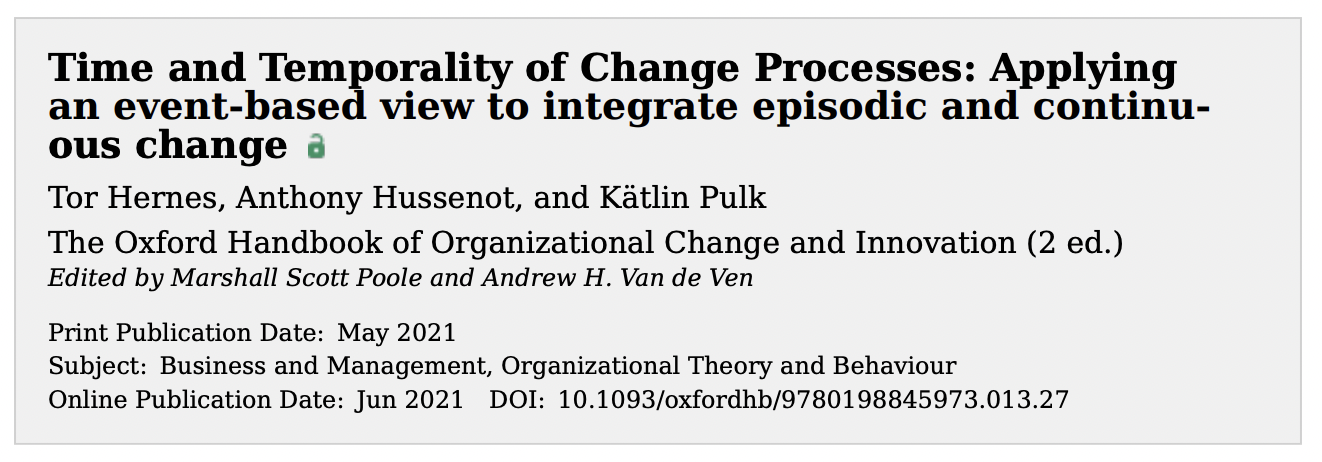Centre for Organization and Time (COT)
Webinar at Carnfield School of Management
May 2024

Last week Tor Hernes gave a webinar at Carnfield School of Management. Entitled Theorizing Time as (and in) Process, the presentation argued for two main views of time in organizational research: As a patterned background for organizing processes or as constitutive of organizing processes. Whereas the former aids theorizing of relatively known challenges, the latter aids theorizing of novel and unexpected challenges that organizations increasingly confront. Many thanks to Ibrat Djabbarov for organizing the webinar with such a amazing turnout (155+ people) from different parts of the world. Wonderful to experience an increasing interest in what we can do with time once we give it its due agency!
Click here to watch the presentation.
New Funding
May 2024
Beyond Knowledge Integration: Changing Temporalities in Times of Breakthrough Innovation
Tight teamwork and knowledge integration are critical for enabling breakthrough innovation. Research has offered much insight into the modes and mechanisms of knowledge integration to successful innovation. However, extant research has paid less attention to the dynamics and temporalities of knowledge integration. Jonas Söderlund and Sofia Pemsel have received 2 MSEK for a research program studying the temporal dynamics of knowledge integration in breakthrough innovation. The research project explores the temporal knowledge integration dynamics through a multiple case study of breakthrough innovation projects to better address the dynamics of engineering work and temporal dynamics of innovative projects. The research program begins in 2024 and ends in 2027 and is funded by Jan Wallander and Tom Hedelius Foundation and Tore Browaldh Foundation at Handelsbanken.
Sofia Pemsel is an Associate Professor at IOA, CBS. Jonas Soderlund is a professor of strategy at Linköping University, Sweden. They have published numerous papers on time and organization, including papers in Human Relations, Research in the Sociology of Organizations, and leading project management journals.
Most Cited Award 2022-2023
May 2024

We are happy to see that Joana Geraldi has received the most cited award 2022-2023 for her paper "A Manifesto for project management research". The paper had around 2,000 downloads and over 20 citations since it was placed online last year. The paper, invites scholars to contribute to project studies, and provide a good entry point to the area, and some relevant themes to study, jointly.
References: Locatelli, G., Ika, L., Drouin, N., Müller, R., Huemann, M., Söderlund, J., Geraldi, J. & Clegg, S. (2023). A Manifesto for project management research. European Management Review, 20(1), 3-17.
https://lnkd.in/dNmM7tgg
New Podcast: With Prof. Blagoy Blagoev and Prof. Tor Hernes
April 2024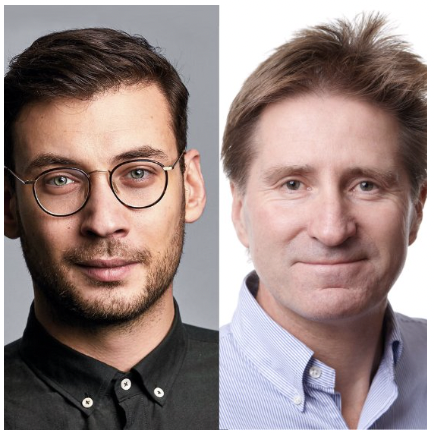
Discussion of the paper: Time as a Research Lens: A Conceptual Review and Research Agenda
Organized by Practice Process Reading Group - Give it a listen here.
@bout time seminar with Dan Wadhwani
April 2024
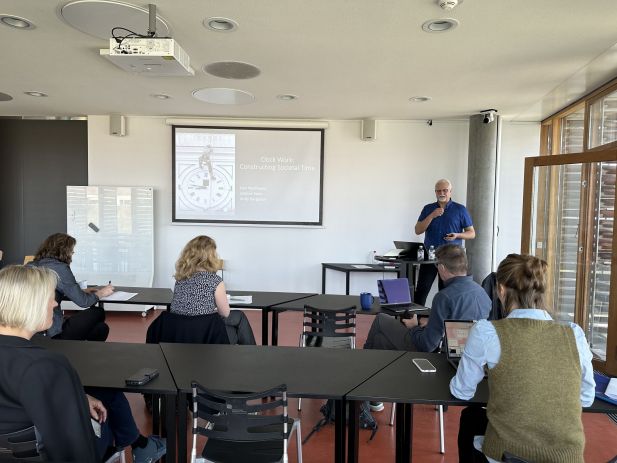
Did you ever think about where time standards come from, how they evolve, and how they may impact business and society? Dan Wadhwani, Professor at USC Marshall School of Business and adjunct Professor at Copenhagen Business School, gave an intriguing talk at Centre for Organization and Time (COT) yesterday. His paper, "Clock Work: Constructing Societal Time Conventions", and co-authored with Joanne Yates (MIT) and Andrew Hargadon, is a study of the processes involved in dividing the US into four timezones in 1883. The crux of his presentation is how social time conventions are anything but immutable. On the contrary, they evolve through processes that the authors label ideating, mobilizing, materializing, and narrating. As time scholars we were also left with intriguing reflections on how seemingly objective time evolves through social and subjective processes whose outcomes are anything but certain. The seminar was attended online by scholars in different time zones.
@bout time seminar with Jeroen Oomen
February 2024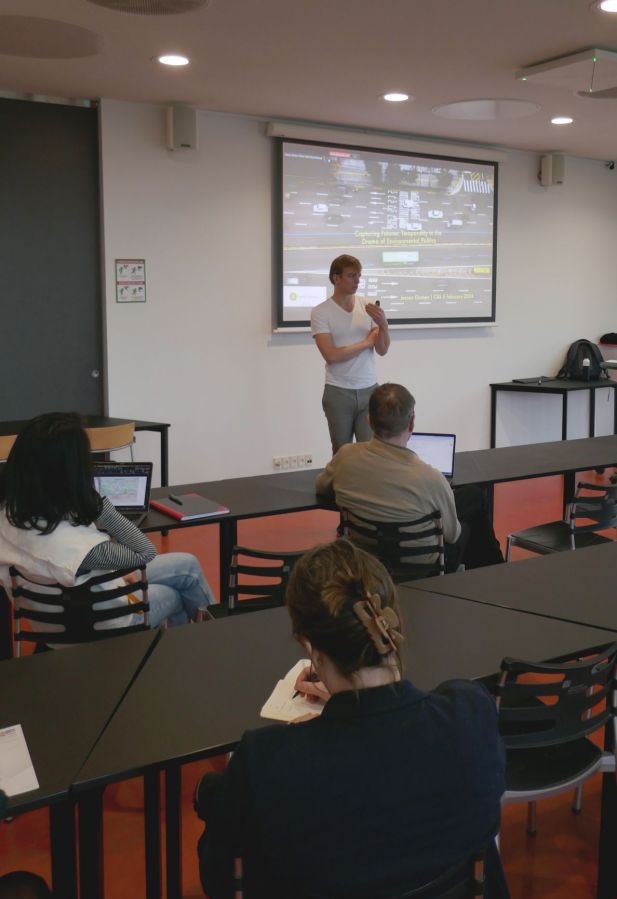
On February 5th, COT had the pleasure to host another “@bout time seminar”, this time with Jeroen Oomen. The seminar was about capturing futures and the temporal aspects of environmental politics, which was based on an excerpt from a current book project by Jeroen and Maarten Hajer. During the seminar, Jeroen talked about the political effects of different temporalities, along with looking at the dramaturgical regime of environmental politics and how it shapes particular temporalities while excluding alternative perspectives. These were further discussed during the “reading group” hosted the following day at CBS, where we read the article “Techniques of futuring: On how imagined futures become socially performative” together. It was a great pleasure to have Jeroen at COT, and we are looking forward to our next seminar.
@bout time seminar with Nina Granqvist
January 2024
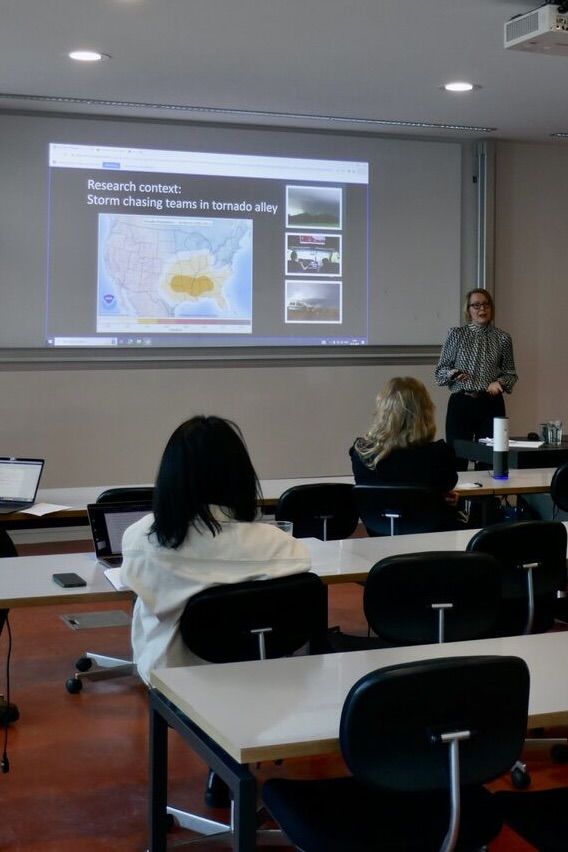
On the 18th on January COT had the pleasure to host an “@bout time seminar” with Nina Granqvist about temporal work to foster group engagement under uncertainty. Through an ethnographic study of storm chasing teams in Tornado Alley, Nina talked about how she and her co-author Derin Kent investigated how groups foster engagement in temporally uncertain settings. As a natural part of the process, the talk by Nina evolved into a detailed conversation with both the people online as well as the attendees at CBS. The hybrid setting of the seminar additionally allowed for of further elaboration from Derin Kent who was present online, to cover the many aspects of their study. It was a great pleasure to have Nina at CBS, and we are looking forward to our next seminar.
Tor Hernes and Majken Schultz have co-authored the following publication on "Time as a Research Lens" with Blagoy Blagoev and Sven Kunisch
December 2023
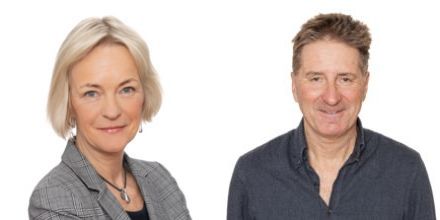
Title: Time as a Research Lens: A Conceptual Review and Research Agenda
Abstract: Time is gaining recognition as an important research perspective, yet the assumptions, concepts, and boundaries of this perspective vary greatly across different fields. This diversity suggests that time offers both significant depth and relevance as a lens for research. However, the diversity of approaches also harbors ambiguity and a lack of coherence, hindering scholars’ ability to integrate insights and harness the full potential of time as a research lens. To address this issue, we review the diverse time-based assumptions, domains, and concepts in extant research. Our review reveals three dominant manifestations of the temporal lens: time as resource, time as structure, and time as process. We analyze and synthesize insights of the three lenses to offer an integrative framework to support future research. The framework informs and reveals opportunities for time-based research by foregrounding connections and contrasts among the lenses. Building on this framework, we discuss two principal pathways for future research: connecting the three lenses through the study of tensions at their interfaces, and enhancing the three lenses through the study of more complex conceptions of time.
Link: https://journals.sagepub.com/doi/full/10.1177/01492063231215032
@bout time seminar and OT@IOA seminar with Jörg Sydow
November 2023
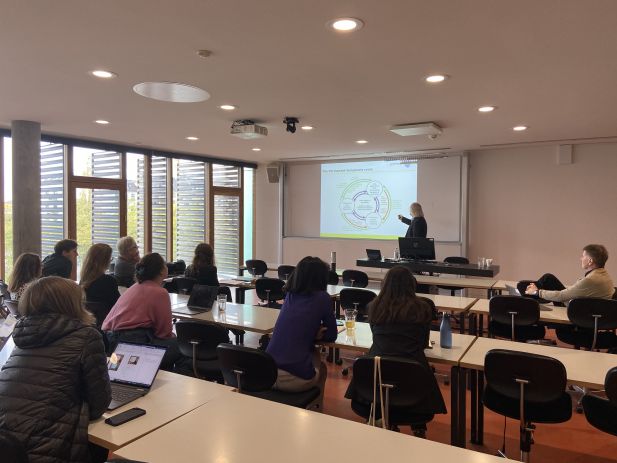
Recently, we had the pleasure and privilege to welcome Jörg Sydow at COT and IOA. Jörg Sydow is a leading organizational scholar, with wide impact in the field. He is a proliferous writer, has been on the editorial board of many top journals, and received several honors throughout his career, including an EGOS Honorary Member. While in Copenhagen, Jörg has given two talks.
OT@IOA lecture with Jörg Sydow
With the provocative title: When practices control practitioners, Jörg presented his work on self-reinforcement cycles (like escalation of commitment and path dependence) “in vivo and in situ” by connecting integrating self-reinforcing dynamics into practice-based theorizing. His work opened a broader discussion and closer look at a life lived forward, where outcomes are necessarily uncertain, and practitioners can always choose to act differently. Tor Hernes kicked-off the conversation, extending some of the notions on self-reinforcing processes and their myriad interfaces with temporality. Participants then embarked on a rich conversation about self-reinforcing practices of e.g. learning, forgetting, destroying and the like in organizational life.
@bout time seminar with Jörg Sydow
On 8.11 we had the pleasure to host a seminar with Jörg Sydow about temporary organizing and practices involved in creating semi-permanent structures out of the temporary organizations. His talk started by contextualizing temporary organizations as an increasingly important field of organization studies, not least with respect to the dimension of time. He then introduced a practice-based understanding of temporary organizing and explored the interplay of the temporary and the “permanent” based on his former studies of project networks (in the television industry) and a more recent study of emergency response. The talk stimulated a rich conversation about time, the temporariness in all forms of organizing, among many other topics.
Tor Hernes and Miriam Feuls have published the edited volume "A Research Agenda for Organisational Continuity and Change with Elgar publications.
October 2023
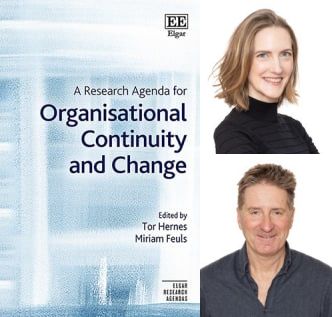
Title: A Research Agenda for Organisational Continuity and Change will be useful for scholars and students of organisation and management, including teachers involved in executive education.
Book description: Research has overlooked the need for modern organisations to enact continuity during periods of change. This Research Agenda addresses this by considering continuity and change as engaging in various forms of mutual interplay. The underlying theme of this book is that change needs continuity just as continuity needs change. In this Research Agenda, internationally renowned contributors offer insights through a wide range of case studies and chart a path for future research. Readers will discover how the continuity-change interplay unfolds in a variety of organisational types and industries. Key examples show the importance of understanding continuity as an integrative part of organisational change at various levels of organisation.
Actionable Futures project:
Sunny Mosangzi Xu presented at CBS' senior management meeting
October 2023
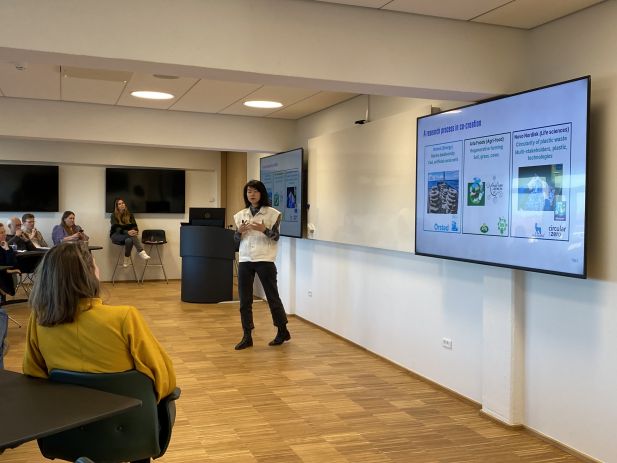
COT member Sunny Mosangzi Xu recently presented insights on co-creating societal impact at CBS' senior management meeting on behalf of the Actionable Futures Project team. Leveraging on experience with the Actionable Futures Project, great reflections were presented on the collaboration with the Project’s case companies Arla, Ørsted, and Novo Nordisk in their pursuit of future climate goals. The presentation also shed light on the project's research approach in comprehending current actions toward desirable futures.
Read more about the Actionable Futures Project here…
Read more about the presentation here…
OT seminar with Sven Kunisch
October 2023
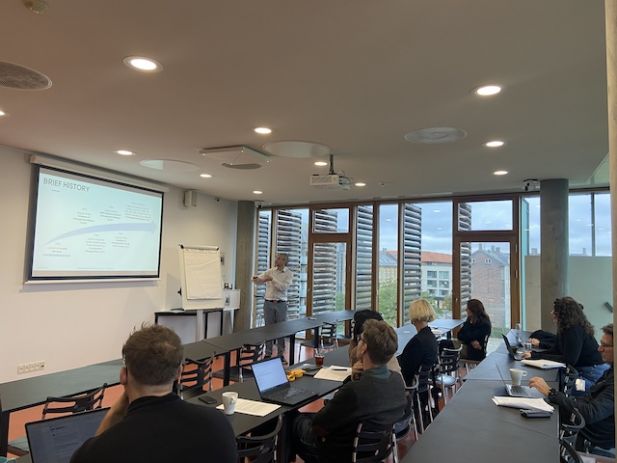
Professor Sven Kunisch (Aarhus University) gave an informative seminar hosted by the Centre for Organization and Time (COT) entitled ”Developing Rigorous and Impactful Review Articles”. Much food for thought on how to use different methods of review, how to motivate reviews, how to scope the literature, and how to achieve impact. Sven showed how different trends of doing review papers have developed over the years and how they have evolved to form a broad body of research.
Conversation @bout Time with Lasse Jonasson
September 2023
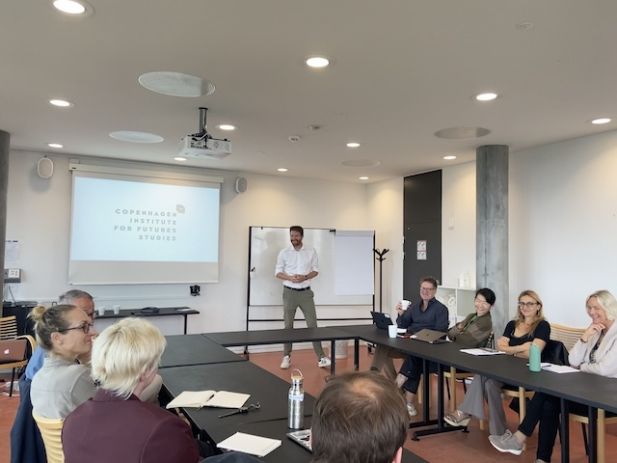
Recently COT hosted a Conversation @bout Time about anticipatory leadership with Lasse Jonasson from Copenhagen Institute for Future Studies. Lasse presented us with a range of dilemmas and solutions faced by companies. The seminar gave insightful perspectives on how the institute is working towards incorporating temporality in business practices and how to lead organizations in times of uncertainty.
New interview with Majken Schultz
September 2023
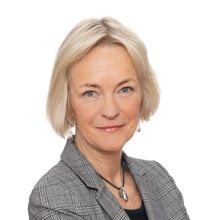
Emil Husted's recent interview with Majken Schultz , featured on the Green Business Forum at CBS, offers an insightful look into COT's current research project: "Making Distant Futures Actionable: Innovating for a Zero Carbon Future".
Listen to the podcast here...
Only in Danish: Nyt Podcast med Majken Schultz
August 2023

Lyt med i “Få det til at ske” Podcastet, hvor Majken Schultz giver en spændende insigt i, hvordan vi gør fremtiden handlebar. I Podcastet sættes gang i en spændende diskussion om klima og temporalitet. Her trækker Majken på sin erfaring som projektansvarlig for Actionable Futures projektet. Læs mere om Actionable Futures projektet her...
New article with Miriam Feuls
August 2023
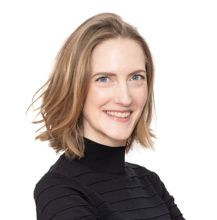
CBS.dk recently interviewed Miriam Feuls about her research on distant futures and her experiences at the Academy of Management annual meeting in Boston.
You can read the article here... (English) or here... (Danish)
NEW PUBLICATION: Jonathan Feddersen, Tor Hernes & Silviya Svejenova have a new publication on processual understanding of buildings
June 2023
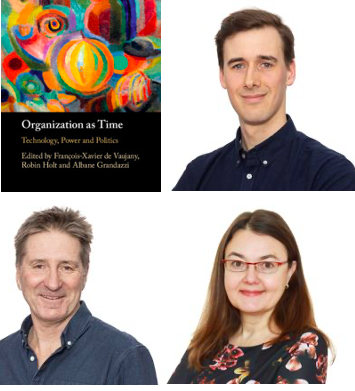
Title: Towards a Processual Understanding of Buildings
NEW PUBLICATION: Miriam Feuls, Christina Lüthy, & Silviya Svejenova have a new publication on Hilma af Klint’s material temporal work
June 2023
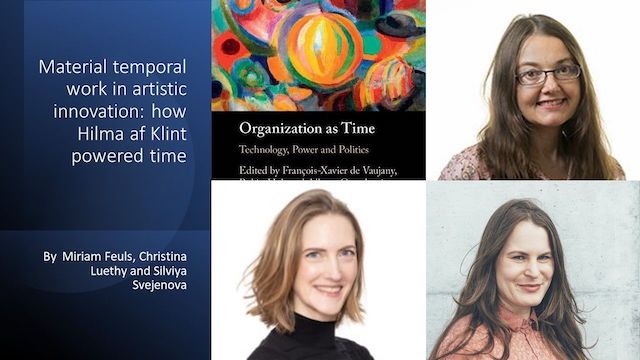
© The Organizations, Artifacts & Practies (OAP) Workshop
Title: Material temporal work in artistic innovation: how Hilma af Klint powered time
New Podcast with Majken Schultz
June 2023
With her expertise as the PI of COT’s research project "Making Distant Futures Actionable", Majken brings an insightful perspective to the CBS Sustain podcast.

Listen to the podcast here...
Event: COT presented at the IOA research forum
May 2023
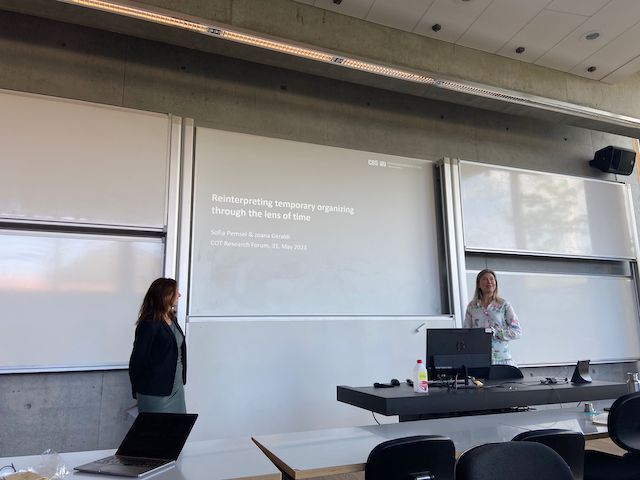
Tor Hernes, Miriam Feuls, Jonathan Feddersen, Sofia Pemsel and Joana Geraldi presented the work at the Centre for Organization and Time at IOA's Research Forum.
Actionable Futures: Writing retreat
May 2023
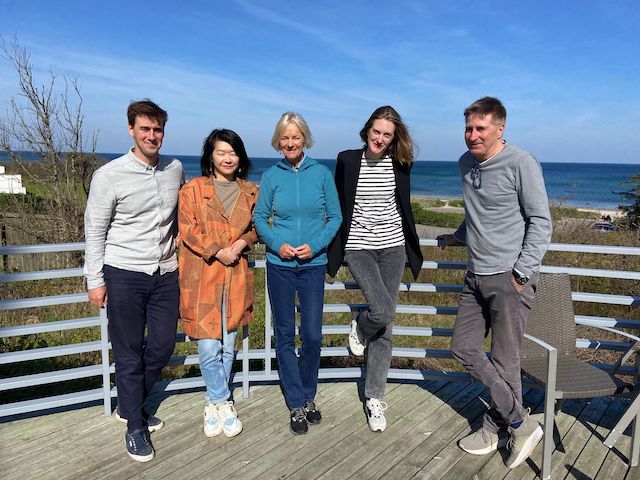
The Actionable Futures team recently conducted a highly productive writing retreat at the beautiful Smidstrup Strand. This serene location provided the perfect backdrop for our focused exploration of valuable literature and insightful ideas for our ongoing research project. Our dedicated team members delved into a wide range of literary resources. Through intensive discussions and brainstorming sessions, we unearthed profound ideas that will shape the trajectory of our research in exciting ways.
For further information regarding the "Making Distant Futures Actionable" research project, please check out our website and LinkedIn page.
Paper Publication:
Harvey Maylor, Joana Geraldi, Alexander Budzier, Neil Turner, & Mark Johnson have a new publication on project performance measurement
May 2023

Link: https://www.sciencedirect.com/science/article/pii/S0263786323000315?dgci...
Title: Mind the gap: Towards performance measurement beyond a plan-execute logic
@bout time seminar with Stefan Gaardsmand Jacobsen

Last Tuesday, Stefan Gaardsmand Jacobsen, Director of the Centre for Applied Ecological Thinking at the University of Copenhagen, gave an @bout time seminar at the Centre for Organization and Time. The presentation by Stefan Gaardsmand Jacobsen focused on the temporality of climate justice in Denmark, providing historical insights into notions of justice, decarbonization sequences, and the discourse on delaying climate change and reflecting on the interplay between justice and temporality.
Read more about the seminar here...
@bout time seminar with Graham Winch
March 2023
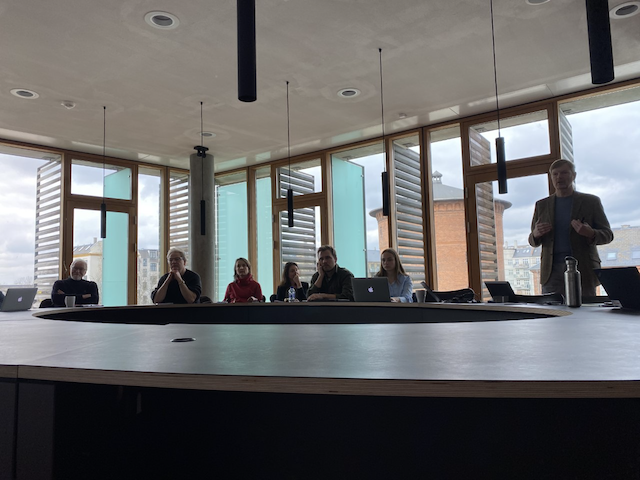
Last Friday, Professor Graham Winch from Alliance Manchester Business School held an @bout time seminar at the Center for Organization and Time. Graham took us on an intellectual journey from temporary organizing to temporal organizing. You can read more about the @bout time seminar here...
Majken Schultz has been appointed as new member of Komitéen for god Fondsledelse
January 2023

Majken Schultz has been appointed as one of the two new members of Komitéen for god Fondsledelse (eng. The Comittee for good Fund Management) where she will contribute with experience from commercial foundations, including her current work as the Chairwoman of the Carlsberg Foundation.
Read more here...
Paper Publication:
Tor Hernes has a new publication on the temporality of sensemaking with David Obstfeld
December 2022
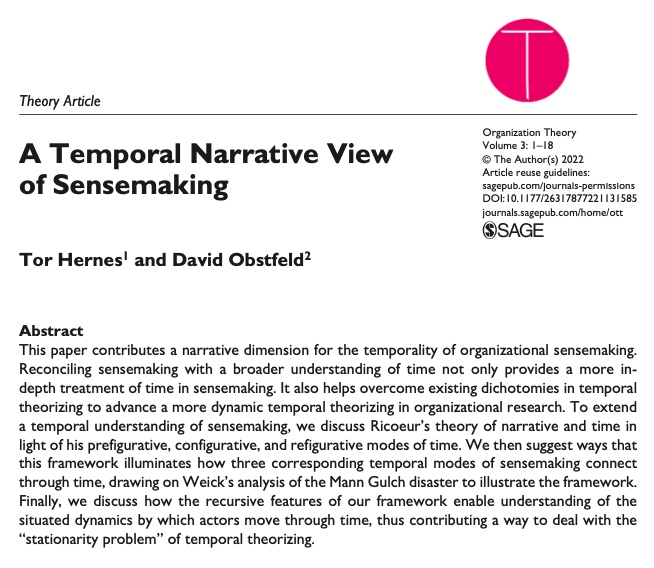
Link: https://journals.sagepub.com/doi/10.1177/26317877221131585
Title: A Temporal Narrative View of Sensemaking
Paper Publication:
Iben Stjerne and Joana Geraldi have a new publication on open strategy with Mathias Wenzel
December 2022
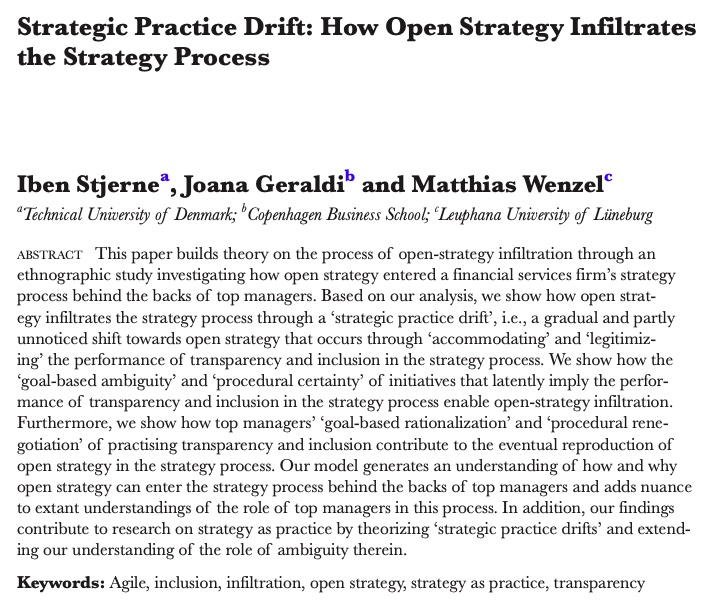
Link: https://onlinelibrary.wiley.com/doi/10.1111/joms.12895
Title: Strategic Practice Drift: How Open Strategy Infiltrates the Strategy Process
Event: COT was presented at the strategy for Net Zero Future workshop at Said Business School, Oxford University
November 2022
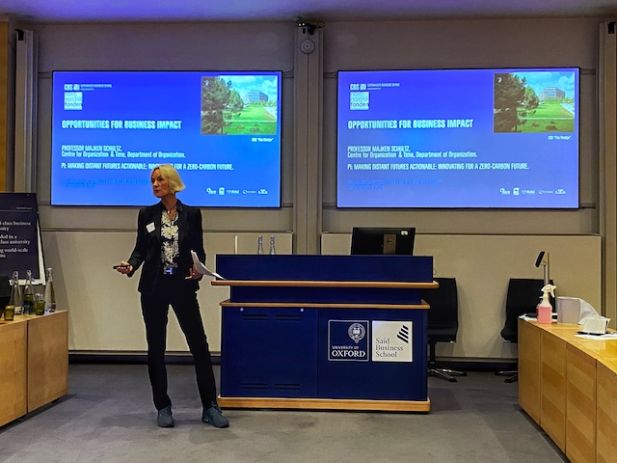
On November 22, 2022 the Center for Organization and Time (COT), joining Oxford Net Zero research initiative, took part in the Strategy for the Net Zero Future workshop at Said Business School, Oxford University. The workshop was organized by Professor Juliane Reinecke and Reseach Lecturer Aoife Brophy. The event attracted more than 80 people signed up to attend, including the Actionable Futures project team and partners, senior and junior reseachers, students from different departments in Oxford, and practitioners from local companies and SMEs.
The workshop started with a debrief of COP27 by Alexis McGivern, Net Zero Standards Manager for Oxford Net Zero. Aiming to connect researchers working at the intersection between climate and business, a panel of speakers introduced different perspectives on defining a net-zero strategy. Professor Tor Hernes, COT director, presented a temporal view on net-zero organizations. Kaya Axelsson, a Ph.D. candidate at the Environmental Change Institute and Policy Engagement Fellow at Oxford Net Zero, provided an overview of the different standardizations of net zero. Dr. Cécile Girardin, Technical Director of the Natural-based Solutions Initiative and Science Lead at Oxford Biodiversity Network, added the perspective on nature-based solutions and net-zerowithout forgetting nature. Dr. Jessica Omukuti, a Research Fellow at the Oxford Net Zero Initiative, talked about A Just Transition to Net-Zero. The facilitated discussions by Aoife Brophy mainly concerned multi-actor involvment in the process of achieving net zero and how to take holistic approach towards net zero.
To forster conversations and connections that would contribute to translating public and private net-zero commitments into action, the last part of the workshop was on opportunities for policy and business impact. Sam Frankhauser, Professor of Climate Economics and Policy at the Smith School for Enterprise and Environment, spoke about the opportunities for policy impact. Professor Majken Schultz, a COT member, the chairwoman of the Carlsberg Foundation, and the Deputy Chair of the Carlsberg Group, illustarted oppportunities for business impact, using examples from the Actionable Futures project. The facilitated discussion by Juliane Reinecke centered around researchers' roles and how researchers can best contribute to these opportunities by collaborating with policymakers and businesses.
Event: Second workshop in the Actionable Futures project
November 2022
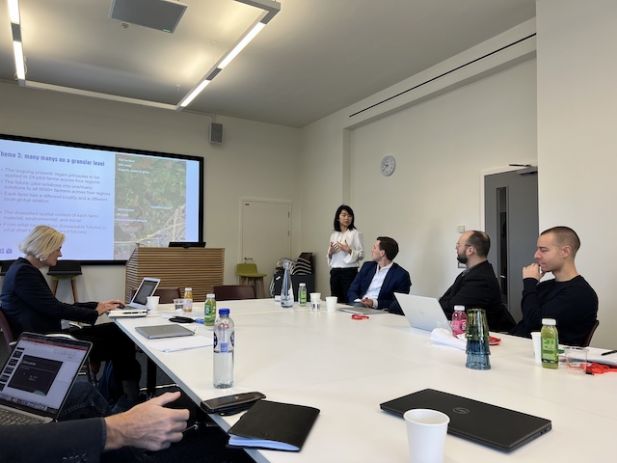
On November 21 - 22, 2022, the Actionable Futures project had its second project workshop, kindly hosted by Professor Juliane Reinecke at the Said Business School, Oxford University. After Professor Majken Schultz kicked off the workshop, postdoc Jonathan Feddersen, Sunny Mosangzi Xu and Assistant Professor Miriam Feuls updated their progress on subprojects Ørsted, Arla and Novo Nordisk. Three sets of inspirational talks pave the way for further discussion on project directions, including Professor Tor Hernes and Jennifer Howard-Grenville on social-ecological translation and nature's time, Professor Raghu Garud on temporal translation and piloting, and Professor Daniel Nyberg and Tima Bansal (with prerecorded video and joined online from Australia) on spatial translation and scaling. All three subprojects recieved constructive and insightful feedback and identified promising tracks to prusue further. The workshop was also joined by Associate Professor Henrik Koll, University of Southern Denmark, Ph.D. fellow Freiderike Döbbe, Stockholm School of Economics, Jacob Andrew Klopp, Penn State College of Business, and Susan Cooper, King's College London.
Paper Publication:
Therese Dille, Tor Hernes and Anne Live Vaagaasar have a new publication on Temporal Transition
October 2022
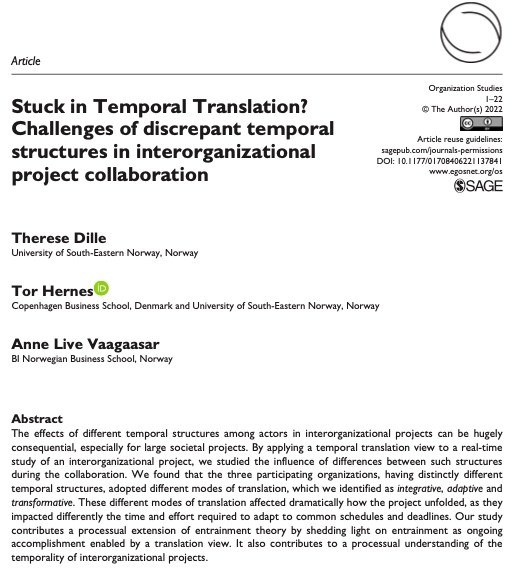
Link: https://journals.sagepub.com/doi/full/10.1177/01708406221137841
Title: Stuck in Temporal Transition: Challanges of discrepant temporal structures in interorganizational project collaboration
Paper Publication:
Miriam Feuls, Mie Plotnikof and Iben Stjerne have a new publication on timely methods
September 2022
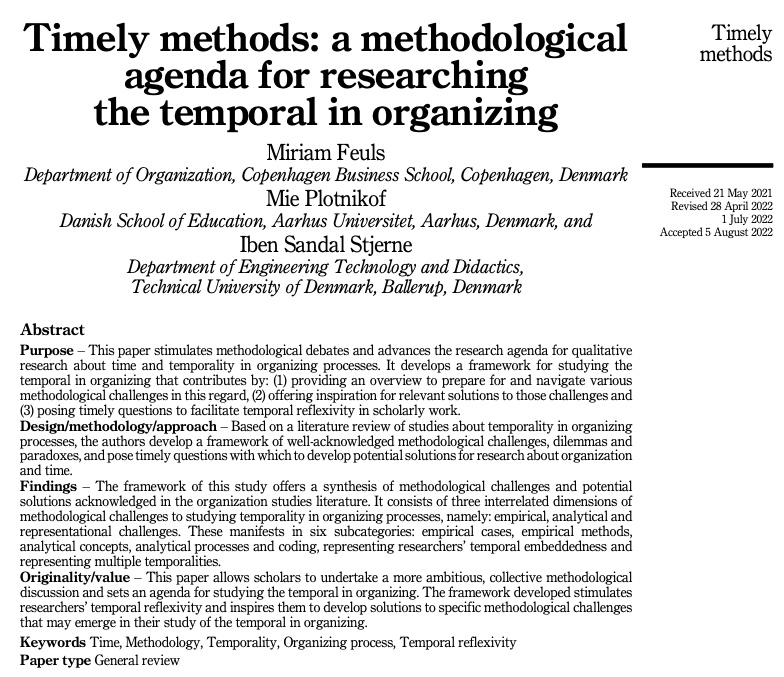
Link: https://www.emerald.com/insight/content/doi/10.1108/QROM-05-2021-2141/fu...
Title: Timely methods: a methodological agenda for researching the temporal in organizing
Paper Publication:
Majken Schultz has a new publication on the temporal interplay of strategy and identity
September 2022
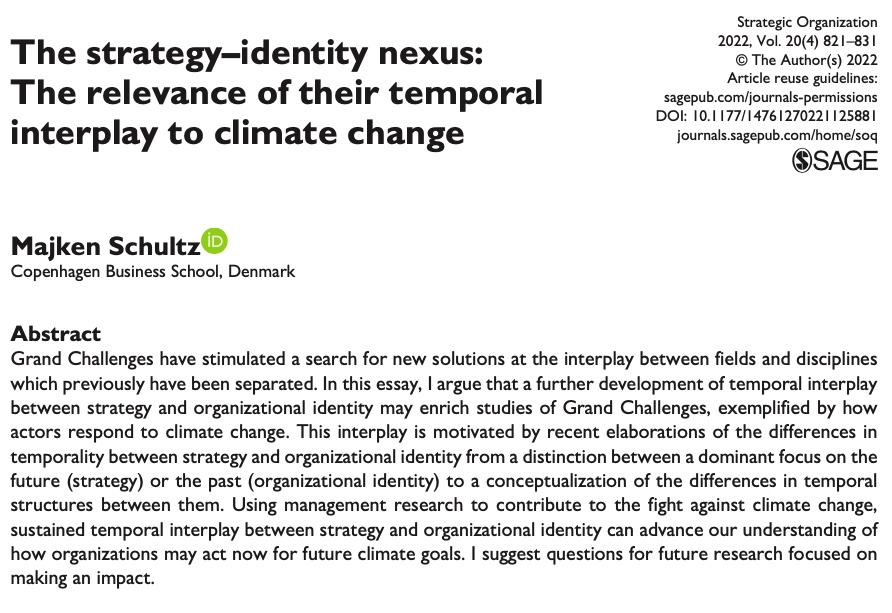
Link: https://journals.sagepub.com/doi/10.1177/14761270221125881
Title: The strategy-identity nexus: The relevance of their temporal interplay to climate change
Interview: Tor Hernes spoke about the Workshop "The Time Nexus of Innovation" at the Carlsberg Academy
August 2022
Interview on cbs.dk with Tor Hernes
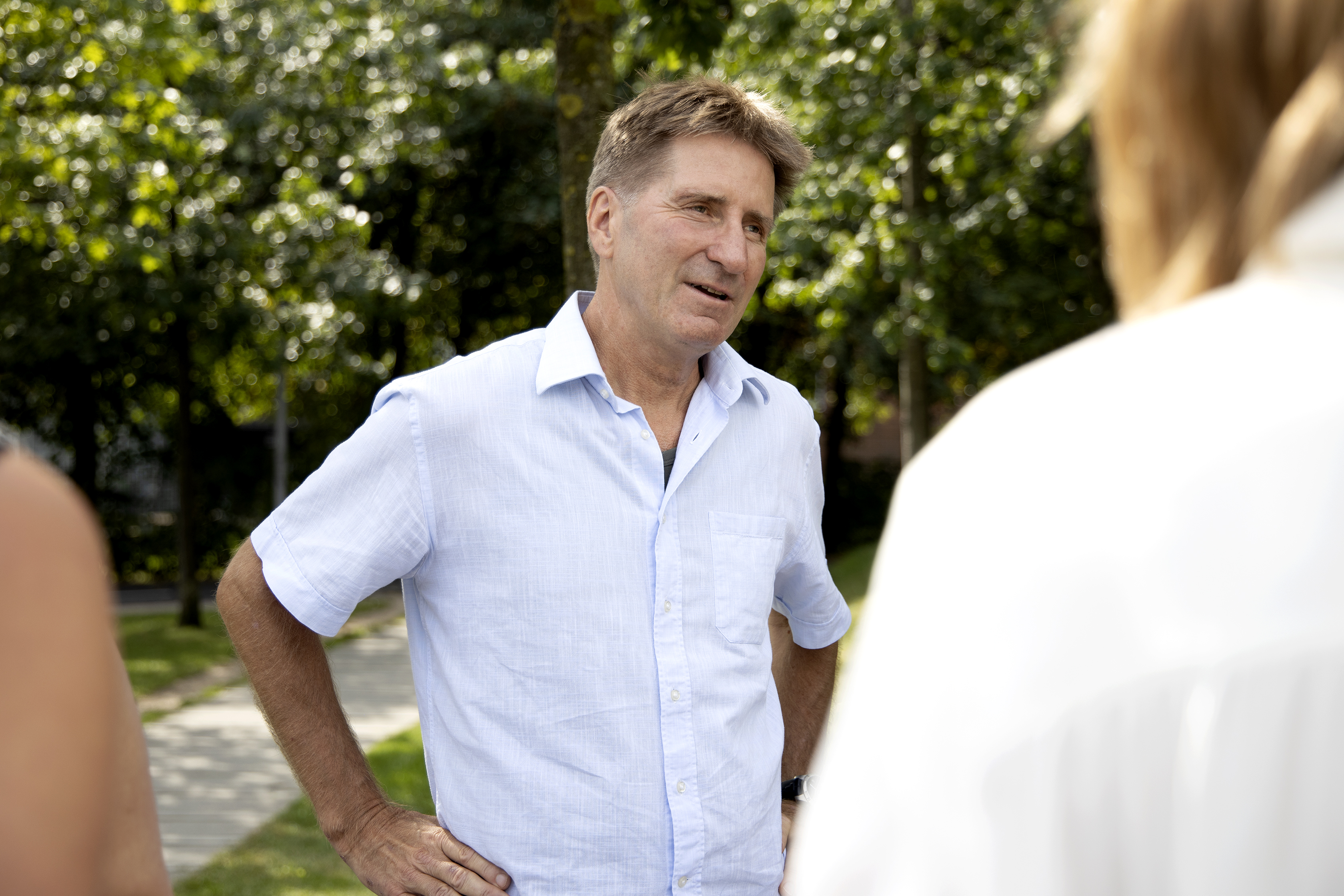
© Agnes Vera Kaufmann, 2019
Tor Hernes, Director of COT and Co-leader of The Temporality of Food Innovation project funded by the Velux Foundation, was interviewed on the implications of the workshop The Time Nexus of Innovation: Innovating sustainable food between tradition and future hosted by COT at the Carlsberg Academy, where an impressive line-up of researchers and practitioners were invited to discuss sustianability and innovation within the food Industry.
In the article, Tor Hernes spoke about the workshop and project results and implications. He also presented five directions that the food industry needs to address in the upcoming years:
"(1)Treat the future as unknown. (2) Bring taste to the fore. (3) Compete through collaboration. (4) Leverage the past. (5) Follow trends to create new trends." (cbs.dk).
Read more here ...
Podcast: Majken Schultz spoke on her inspiring Career at CBS
July 2022
Majken Schultz is interviewed on the CBS Wire podcast: 'Out of the Box'
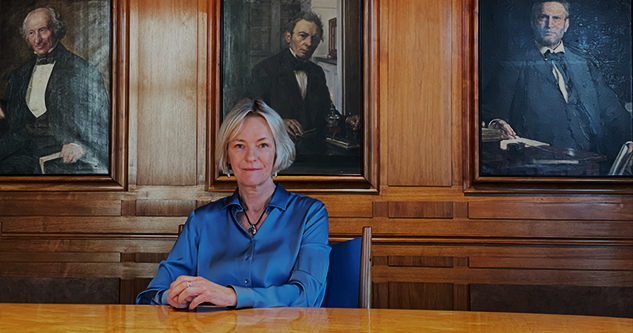
Majken Schultz talks about her 38 years at Copenhagen Business School, her time at the Department of Organization, and the Centre for Organization & Time. She describes how she gains inspiration from teaching her executive students, uses her time in nature for reflection, and how her greatest achievements are collaborating with other researchers globally and locally.
Listen to the Podcast here ...
Senior Vice-President of the Novo Nordisk Foundation, Claus Felby, visited the Actionable Futures Team
June 2022
Claus Felby, Senior Vice-President of the Novo Nordisk Foundation joint the Actionable Futures Team for an Early Stage Status Update.
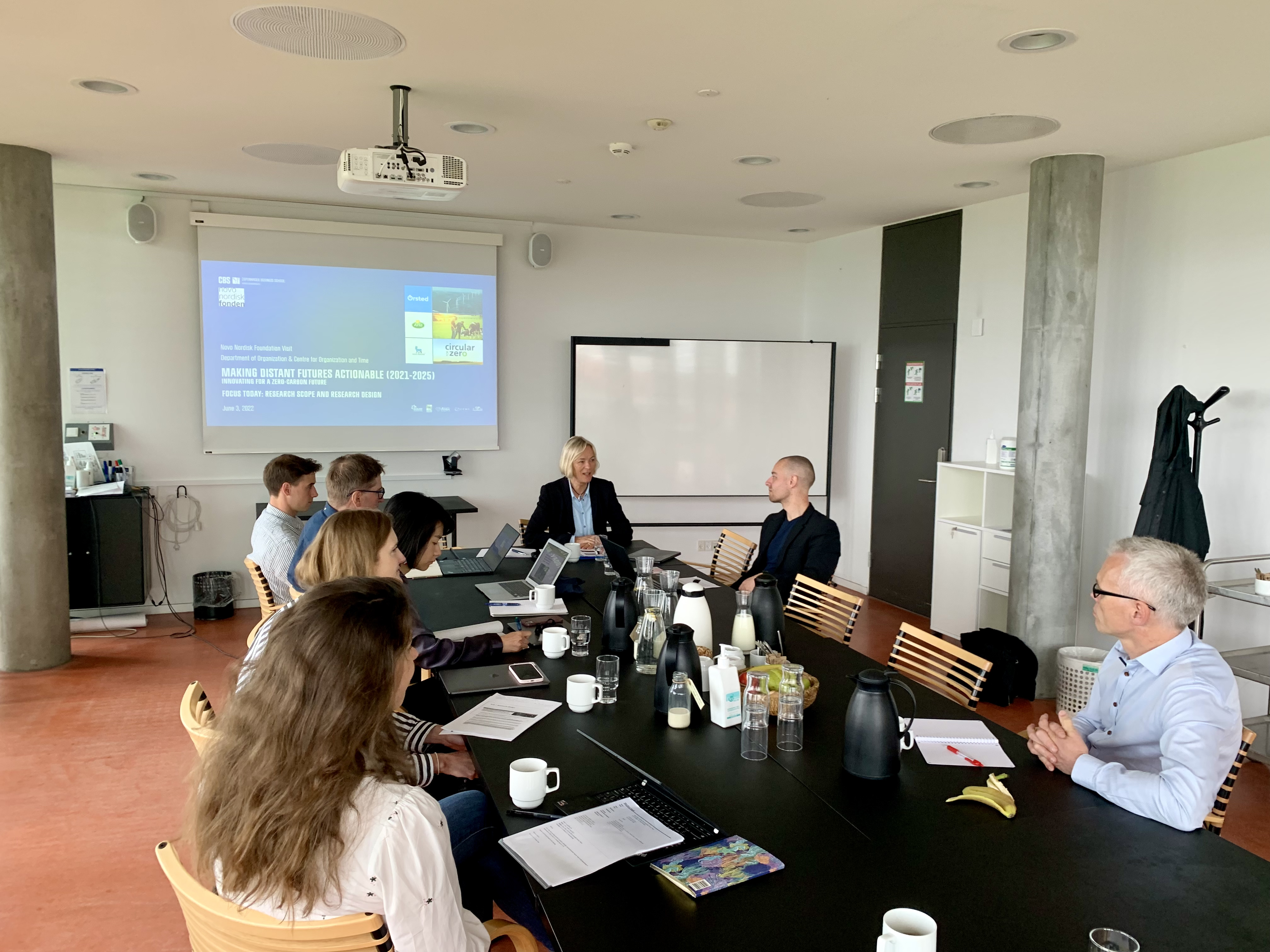
As one of the first Social Science research projects funded by the Novo Nordisk Foundation, the Actionable Futures Team had the great honor of a visit by the beneficiary and Senior Vice President of the Foundation, Claus Felby. An introduction of the team, our international partners, and the administrative support team and an overall dtatus update on the project were presented by Professor Majken Schultz. Professor Tor Hernes introduced the Centre for Organization and Time and led into the wider questions of the research on time. Post-Doc Henrik Koll introduced the Ørested subproject, which he collaborates on with Jonathan Feddersen. Subsequently, Post-Doc Sunny Mosangzi Xu shared her current insights into the Arla sub-project, supported by Assistant Professor Miriam Feuls, who continues her research on Arla and leads the Novo Nordisk sub-project. The Actionable Futures Team was joined by Nora Ørum Ringdal, who builds together with Lonni Faulch the administrative support team of the project. Claus Felby offered some very exciting insights, and intriguing questions and shared some critical reflections.
Jonathan Feddersen is shortlisted for the Grigor McClelland Doctoral Dissertation Award
June 2022
Jonathan Feddersen is one of three finalist of the Grigor McClelland Doctoral Dissertation Award.

Jonathan Feddersen, Post-Doc on the Actionable Futures Project, has been shortlisted for the annual Grigor McClelland Doctoral Dissertation Award awarded by the Journal of Management Studies (JMS), the Society for the Advancement of Management Studies (SAMS), and the European Group for Organizational Studies (EGOS). The award "aims to promote and recognize innovative PhD research in management and organization studies ... its primary focus is to recognize and award doctoral research that is expansive and imaginative in that it covers significantly new terrain or counters existing thinking within management and organisational research." As one of three finalists, Jonathan will have the honour to present his research at a special award ceremony, which will be held during the 2022 EGOS conference at WU Vienna, Thursday, July 7, 8:00pm-9:15pm (Austria Time), Library Center, Clubraum. After the presentations, the award committee will select the winner of the £5,000 award.
Miriam Feuls has received the Tudor Rickards & Susan Moger Award
May 2022
Miriam Feuls has received the Tudor Rickards & Susan Moger Award for the Best Paper published in Creativity and Innovation Management in 2021 together with Marc B. Stierand, Viktor Dörfler, David M. Boje, and Usha C.V. Haley

Miriam Feuls, Marc B. Stierand, Viktor Dörfler, David M. Boje, and Usha C.V. Haley have received the Tudor Rickards & Susan Moger Award for the Best Paper published in Creativity and Innovation Management in 2021 for their paper “Practices of creative leadership: A qualitative meta-analysis in haute cuisine” with the following motivation:
The paper offers a very innovative and creative perspective on a critical issue (creative leadership) with an interesting, relevant, and inspirational empirical context. It is exciting to read, and many voters reflected on the paper as an excellent illustration of the CIM spirit. The paper has a novel and creative structure and writing style. It conceptualises and brings to life nine characters of leadership in a way that readers can easily relate to. The meta-analysis is original, well presented and explained. Beyond the specific material on cuisine, the paper is a very good example of rigourous method in qualitative research. The three propositions both capture the essence of the work and provide solid guidance for discussion and future work. We feel that the paper will influence the literature of creative leadership by these nine archetypes. Future research may use and elaborate on this typology to conduct new studies and further develop the field. Therefore the study's contributions are not limited to the direct results but way beyond their field.
Event: Launch of Tor Hernes' Book "Organization & Time"
April 2022
Tor Hernes’ book Organization and Time published by Oxford University Press proposes an integrative theoretical framework to more fully theorize the role of time in organizational and social research.
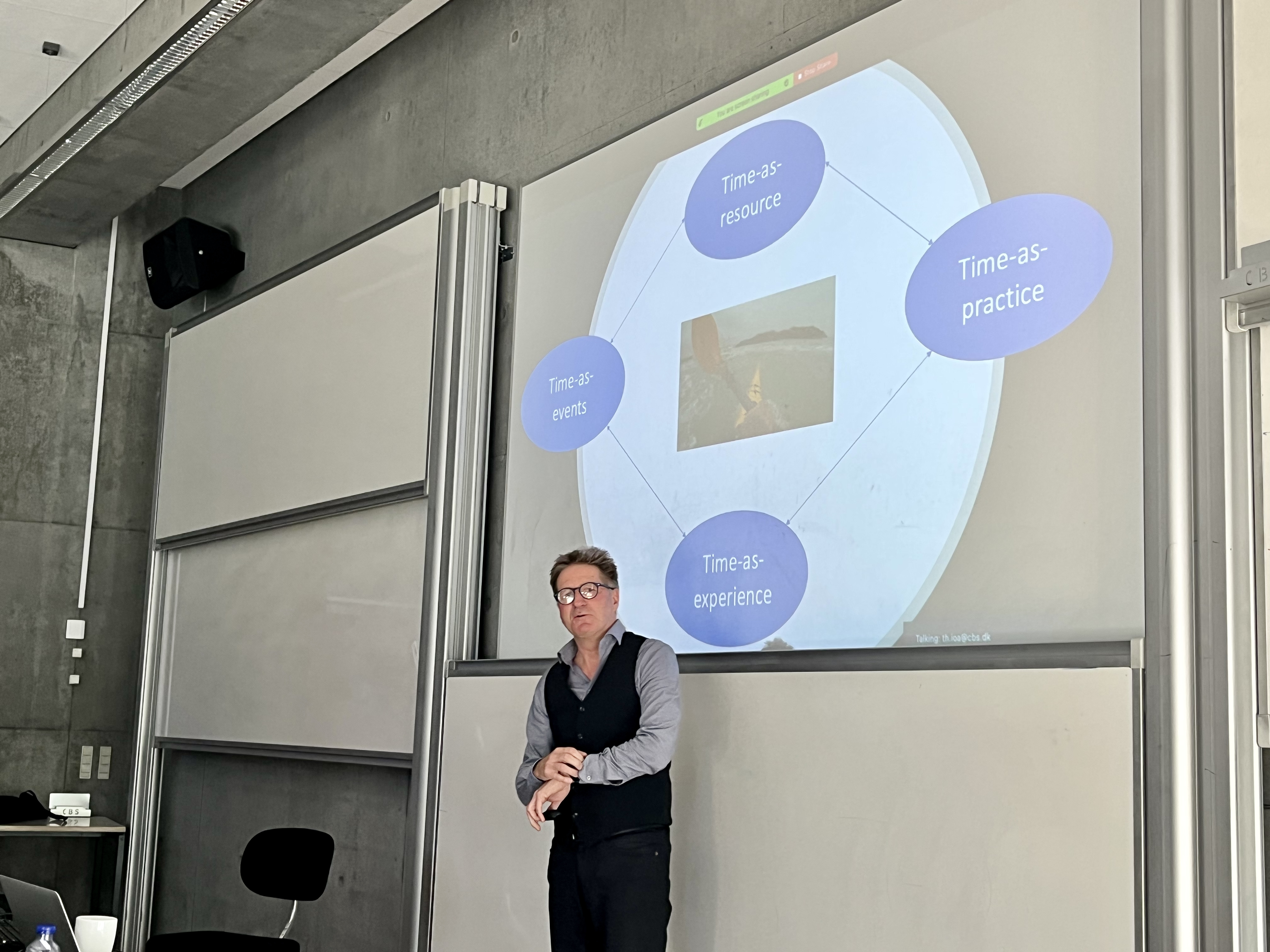
Tor Hernes presented his book "Organization & Time"
Tor Hernes & Silviya Svejenova Velikova argued in Børsen
March 2022
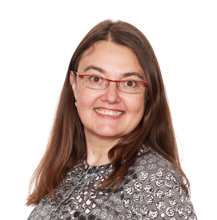

Article: Debate with Tor Hernes & Silviya Svejenova Velikova
They debated on the requirements to innovate the food industry to reach distant climate goals. The article concludes their research project, The Temporality of Food Innovations, funded by the Velux Foundation.
Link to article: https://borsen.dk/nyheder/opinion/debat-cbs-professorer-den-gronne-omstilling-kraever-en-radikal-aendring-af-vores-madvaner-og-det-haster
Article on Professor Majken Schultz on cbs.dk
January 2022
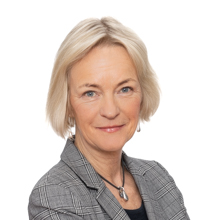
Interview by cbs.dk with Professor Majken Schultz.
She is interviewed on her career, her new position as the chairwoman of the Carlsberg Foundation, being a role model for young female researchers, and her current research with the Centre of Organization and Time (COT) and the Actionable Futures Project.
Link to article: https://www.cbs.dk/en/the-press/news/professor-copenhagen-business-school-majken-schultz-is-the-new-chairwoman-of-the-carlsberg
Forthcoming Book:
Tor Hernes will publish his book Organization and Time in February
January 2022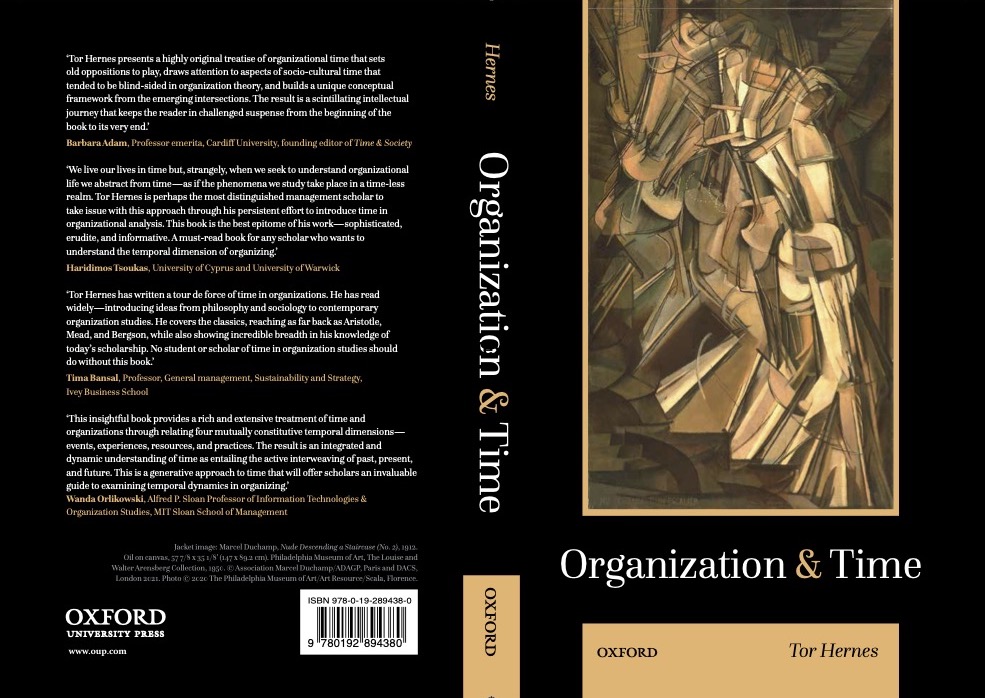
Link: https://global.oup.com/academic/product/organization-and-time-9780192894380?lang=en&cc=us#
Title: Organization & Time
Description: Observed through a temporal lens, organizational life fluctuates among moments of instantaneity, enduring continuity, and imagination of distant times. This movement stems from the fact that actors are continually faced with multiple intersecting temporalities, obliging them to make choices about what to do in the present, how to understand the past they emerge from, and how to stake out a possible future. Although scholars have widely recognized actors' multitemporal reality, it remains to be more fully theorized into an integrative framework. In this book, Tor Hernes takes up this challenge by combining foundational ideas from philosophy, sociology, and organization theory into an integrative theoretical framework of organizational time. Based on a review of the literature, his definition of time includes four dimensions: experience, events, resource, and practice. He provides examples of how these four dimensions evolve through mutual interplay and how they are underpinned by what he calls narrative trajectory. He then discusses implications for key topics in organizational research, including materiality, leadership and continuity and change. Organization and Time is for scholars and advanced students of organization studies, management studies, technology studies, and sociology.
Reviews:
Barbara Adam, Professor emerita, Cardiff University, founding editor of Time & Society:
‘Tor Hernes presents a highly original treatise of organizational time that sets old oppositions to play, draws attention to aspects of socio-cultural time that tended to be blind-sided in organization theory, and builds a unique conceptual framework from the emerging intersections. The result is a scintillating intellectual journey that keeps the reader in challenged suspense from the beginning of the book to its very end.’
Haridimos Tsoukas, University of Cyprus and University of Warwick:
‘We live our lives in time but, strangely, when we seek to understand organizational life we abstract from time—as if the phenomena we study take place in a time-less realm. Tor Hernes is perhaps the most distinguished management scholar to take issue with this approach through his persistent effort to introduce time in organizational analysis. This book is the best epitome of his work—sophisticated, erudite, and informative. A must-read book for any scholar who wants to understand the temporal dimension of organizing.’
Tima Bansal, Professor, General management, Sustainability and Strategy, Ivey Business School:
‘Tor Hernes has written a tour de force of time in organizations. He has read widely—introducing ideas from philosophy and sociology to contemporary organization studies. He covers the classics, reaching as far back as Aristotle, Mead, and Bergson, while also showing incredible breadth in his knowledge of today’s scholarship. No student or scholar of time in organization studies should do without this book.’
Wanda Orlikowski, Alfred P. Sloan Professor of Information Technologies & Organization Studies, MIT Sloan School of Management:
‘This insightful book provides a rich and extensive treatment of time and organizations through relating four mutually constitutive temporal dimensions— events, experiences, resources, and practices. The result is an integrated and dynamic understanding of time as entailing the active interweaving of past, present, and future. This is a generative approach to time that will offer scholars an invaluable guide to examining temporal dynamics in organizing.’
Event: Kick-Off workshop in the Actionable Futures Project
November 2021
The full project team meet for two days for an exciting and productive kick-off workshop at CBS.
It was the first opportunity for the CBS team to with the international partners of the project, and except for Daniel Nyberg, who participated with a video, all the partners from Canada (Tima Bansal); US (Raghu Garud) and the UK (Jennifer Howard-Grenville and Juliane Reinecke) were present. Setting the stage, the four postdocs presented the three subprojects focused on Ørsted, Arla and Novo Nordisk. It became two intense and constructive days, where we explored the conceptual issues in a study of how actors enact the distant future of climate change, and further developed the specific research design across the subprojects.
The CBS team is now complete with Majken Schultz (PI) and Tor Hernes (Co-PI) along with four postdocs: Miriam Feuls; Jonathan Feddersen, Henrik Koll, and Sunny Xu, along with Sophie Lervad Sørensen, and Vera Simoneit as research assistants. The project is called “Making Distant Futures Actionable- Innovating for a Zero-Carbon Future” and is funded by Novo Nordisk Foundation (2021-2024).
Event: COT hosted a workshop at the Carlsberg Academy
November 2021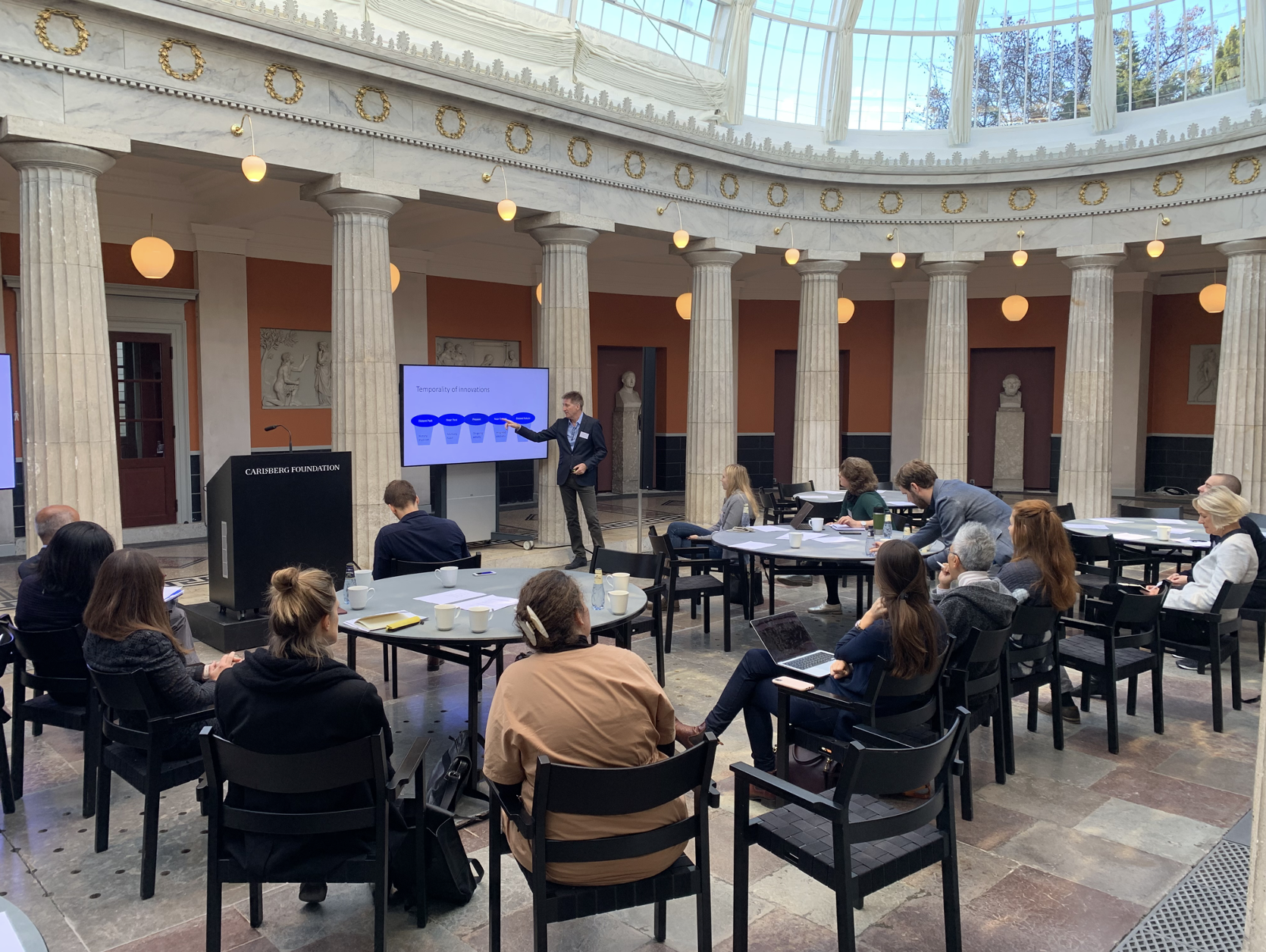
On Nov 22-23 2021, the Centre for Organization and Time (COT) hosted the workshop “The Time Nexus of Innovation: Innovating sustainable food between tradition and future”, which took place in the beautiful, recently renovated Carlsberg Academy. The workshop involved presentations and participation by an impressive line-up of leaders, entrepreneurs, and researchers from the Danish food industry and discussions between them and prominent innovation and organization researchers at CBS and internationally.
Professor Majken Schultz, COT member and member of the Board of Directors, Carlsberg Foundation, gave the Opening address on the legacy of Carlsberg’s founder J.C. Jacobsen as a way to look into distant futures.
Professor Tor Hernes, COT director, introduced the workshop on food and time, and posed some burning questions.
COT member Professor Silviya Svejenova presented “The temporality of food innovations” Velux-funded project, led by Professor Hernes and her, and Dr Miriam Feuls, Assistant Professor Iben Stjerne, and Associate Professor Mie Plotnikof as sub-project leaders, which inspired the encounter.
The workshop unfolded in three main streams of presentations, followed by round-table discussions and comments in plenary.
The discussions revolved around the responsibility of large companies to work towards sustainable futures and the need to recognize the role of farmers in achieving sustainable food transition; the importance of researchers, entrepreneurs, communities, and movements in powering new ideas, and not least the role of taste and chefs towards the development and acceptance of new solutions.
To discuss opportunities for further research on time, innovation and organization, the workshop was preceded and followed by discussions of researchers from the COT-affiliated projects with internationally recognized researchers in the field of innovation, organization, and sustainability, such as Professors Tima Bansal, Raghu Garud, Julianne Reinecke, Matthias Wenzel, Associate Professor Christine Moser, among others, as well as from CBS, such as Professor Eva Boxenbaum, Associate Professor Stine Haakonsson, Assistant Professor Madeleine Rauch, and post-docs from other Velux-funded research projects at CBS (e.g. NICHE, TITAN).
Event: COT hosted a workshop with Associate Professor Mogens Rüdiger
November 2021
On November 19th, the Actionable Futures project hosted leading Danish energy historian, Associate Professor, Mogens Rüdiger from Aalborg University for a workshop on the becoming of Ørsted’s green transformation.
Rüdiger’s work includes more than 120 publications within energy/climate and infrastructure history, European history, and business history. For his outstanding work, he also received the Hartman Award in 2020.
Rüdiger’s visit provided CBS researchers Trine Pallesen, Stine Haakonsson, Katrine Maria Lumbye, Jonathan Feddersen, Henrik Koll and two master thesis students Camilla Henriksen and Anna Lovisa Ek an opportunity to discuss how sustainability became important in the field of practice in which Ørsted operates and how particular events and turning points have contributed (and still contributes) to the becoming of the company’s green transformation. The Actionable Futures project will dive deeper into Ørsted in the next three years as one of three case companies featured in the larger study about how organizational actors make distant futures actionable as they move towards climate goals.
The project would like to thank Mogens Rüdiger and all the other workshop participants for their contributions to a great day.
Chapter Publication:
Henrik Koll has published a book chapter together with Jette Ernst
November 2021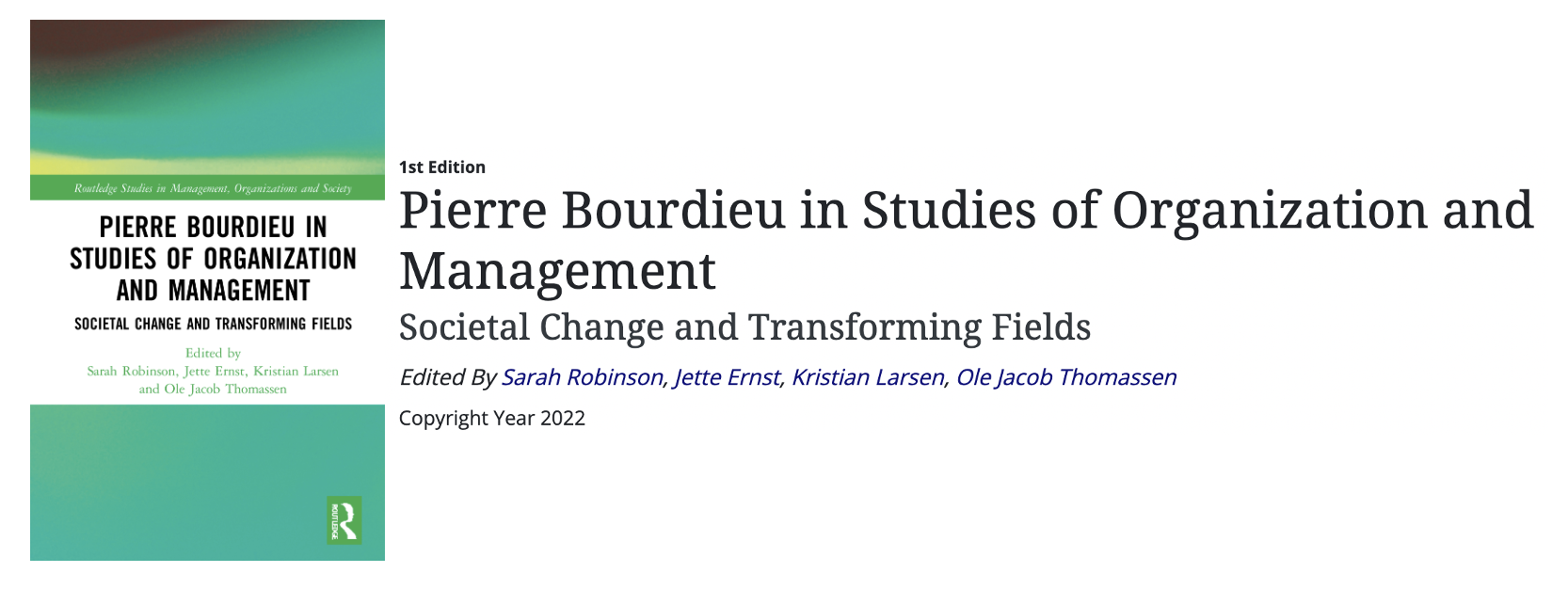
Link to the book: https://www.routledge.com/Pierre-Bourdieu-in-Studies-of-Organization-and-Management-Societal-Change/Robinson-Ernst-Larsen-Thomassen/p/book/9780367893354
Title of the chapter: Caught between times: Explaining resistance to change through the tale of Don Quixote
Abstract: This chapter investigates the responses of front-line managers and technicians to organisational change in a Scandinavian telecommunications company from a temporal perspective. Based on an ethnographic study in the company’s operations department 25 years after the privatisation of the company, it shows how temporal assumptions impacted managers’ and technicians’ responses to change and their experience of work life quality. Drawing on Bourdieu’s temporalization of practice, the chapter unfolds an alternative understanding of time as both a structured and a structuring structure and it demonstrates how Bourdieu’s temporal epistemology offers an alternative theorization of the responses of workers and managers to sweeping organisational change. The chapter asserts that the temporal dimension of Bourdieu’s work deserves more attention in organisation and management studies.
Paper Publication:
Miriam Feuls has published a paper on Practices of Creative Leadership together with Marc B. Stierand, Viktor Dörfler, David M. Boje, Usha C. V. Haley
November 2021

Link: https://doi.org/10.1111/caim.12471
Title: Practices of creative leadership: A qualitative meta-analysis in haute cuisine
Abstract: Creative leadership has been studied in different collaborative contexts that can be summarized as facilitating employees' creativity, directing the realization of the creative vision of a leader and integrating different and diverse creative contributions. In this paper, we present the findings from a qualitative meta-analysis of literature-based accounts of chefs' creative leadership practices from the context of haute cuisine. We bring together both the leader-chefs' and academic authors' understandings of practices available in scholarly papers to achieve a credible picture of creative leadership practices in haute cuisine. We present our findings as a meta-vignette introducing nine prototypical characters representing patterns of practices that leader-chefs perform as they are fostering creativity. We further demonstrate when and how leader-chefs employ practices that are more typical of facilitating and integrating contexts. The nine characters afford an immediate intuitive understanding of the creative leadership practices in haute cuisine, helping scholars to look for and analyse creative leadership and support creative leaders to understand better and be more mindful of their practices.
Leadership changes at COT
October 2021
It has been decided that a leadership group will be in charge of practical and strategic initiatives at COT.
The leadership group will consist of a core team plus PIs of projects that operate as part of COT. PIs will be part of the group for as long as the projects are in operation.
Currently, the core team will consist of Tor Hernes and Miriam Feuls. Majken Schultz will be part of the leadership group as PI of the Actionable Futures project, as will Silviya Svejenova, who is co-PI of the Temporality of Innovations project. In order to gain broader support, there will be an Advisory Board consisting of various scholars from CBS and other schools/institutions.
Visiting scholar at COT: Professor Tima Bansal
October 2021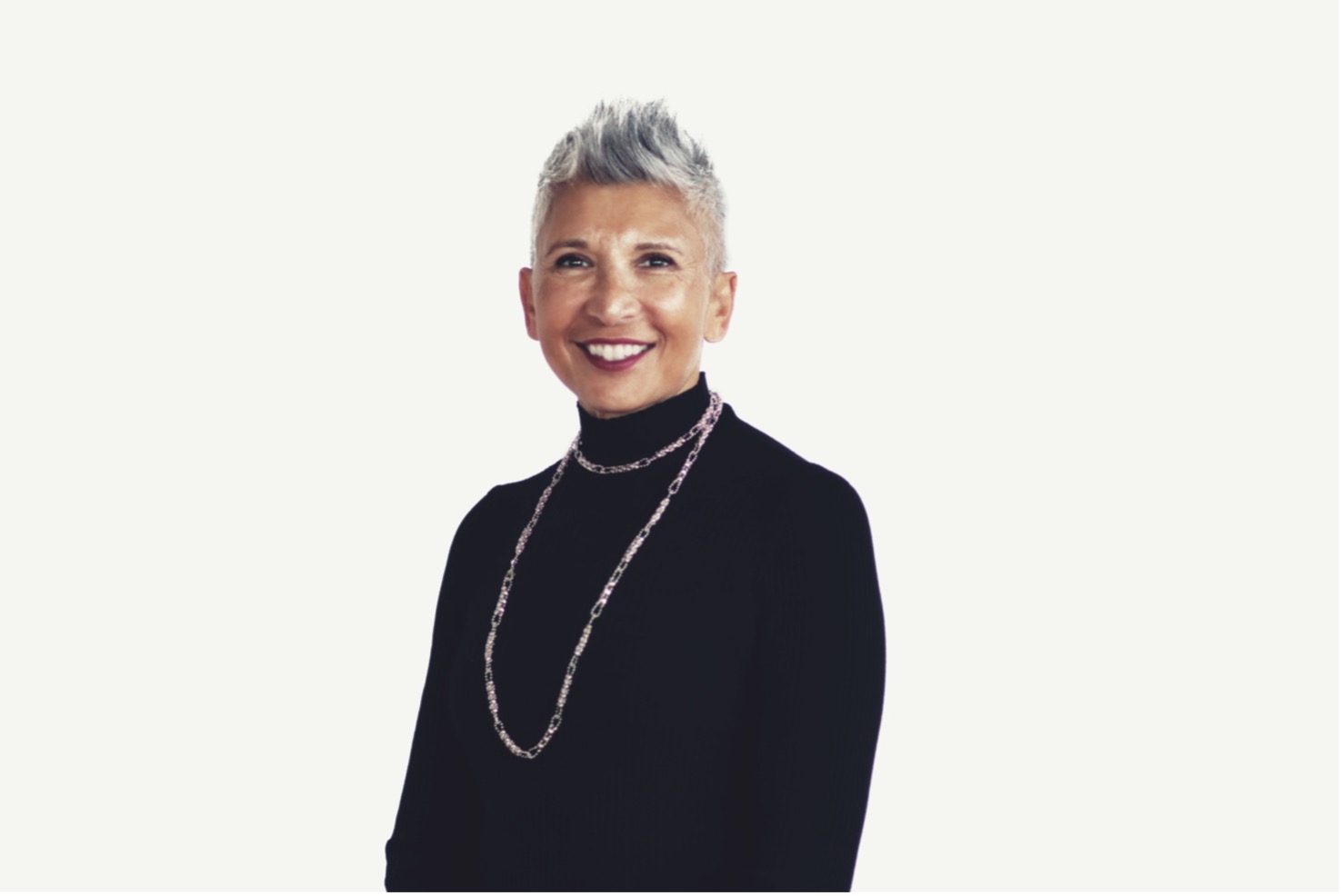
Professor Tima Bansal, from the Ivey Business School, is currently a visiting scholar at COT, funded by an Otto Mønsted grant. She collaborates with staff at COT to further develop knowledge in four distinct areas:
- The tensions and dynamics between short-term and distant time horizons
- Sustainability-related research, especially issues related to business and the natural environment
- Bridging the research practice-gap, especially with her experience at the Network for Business Sustainability
- Qualitative research methods on time
Professor Tima Bansal is an internationally recognized scholar in business sustainability. She founded and continues to direct Ivey's Centre for Building Sustainable Value and the Network for Business Sustainability (nbs.net). She also leads Ivey’s Innovation Learning Lab. She is also Chairing Canada’s Expert Panel on the Circular Economy, which involves 16 leaders across academia, NGOs, government and business. Dr. Bansal has published over 50 peer-reviewed academic journal articles, two scientific monographs and co-edited the Oxford handbook of Business and the Natural Environment.
Welcome!
(For more information about Tima Bansal’s work, click here.)
Event: Tor Hernes and Majken Schultz will give a keynote at Leuphana University
September 2021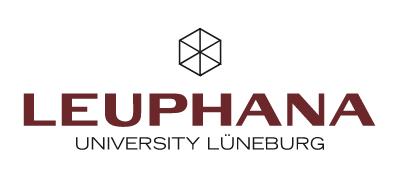
Tor Hernes and Majken Schultz will give a keynote at a workshop on Time & Temporality in Organization Theory at Leuphana University on Friday, September 17th.
The title of their talk is "The becoming of organizational time and its infusion into organizational phenomena".
Paper Publication:
Vibeke Kristine Scheller has published a paper on Temporal Patient Trajectories
August 2021
Link: https://www.emerald.com/insight/content/doi/10.1108/JHOM-09-2020-0355/fu...
Title: Temporal patient trajectories: long stories in short admissions
Abstract: The paper provides new insights into the challenges of managing trajectories in same-day discharge schemes where the pressure to move quickly and ensure patient discharge is intense. The paper offers a novel theoretical perspective on trajectory management as an ongoing temporal process. The analysis displays temporal tensions between patient experiences and the accelerated discharge scheme and how professionals manage to overcome these tensions by bridging the patient's long illness story and the short trajectory within the cardiac day unit.
Chapter Publication:
Tor Hernes has published a chapter in the Oxford Handbook of Organizational Change and Innovation
Tor Hernes has published a chapter in the Oxford Handbook of Organizational Change and Innovation, edited by Andrew Van de Ven and Marshall Scott Poole. The chapter, entitled "Time and Temporality of Change Processes - Applying an Event-based view to Integrate Episodic and Continuous Change", is co-authored with Anthony Hussenot (Cote d'Azur University)and Kätlin Pulk (Estonian Business School).
Link: https://www.oxfordhandbooks.com/view/10.1093/oxfordhb/9780198845973.001....
Article in Forbes by affiliate Professor Tima Bansal
May 2021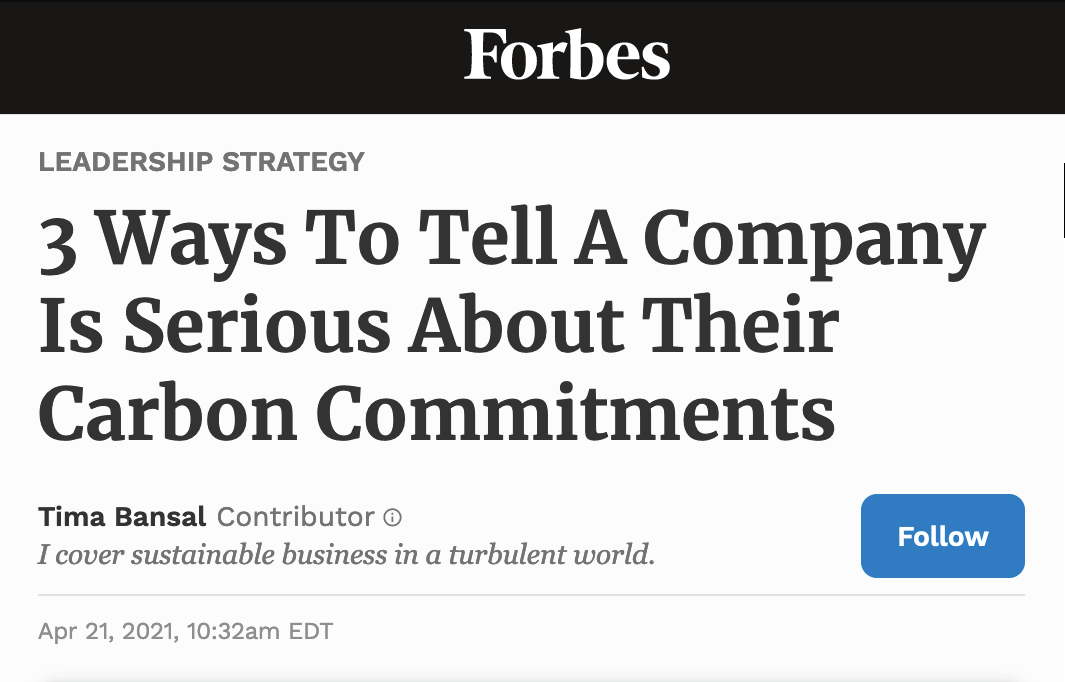
Tima Bansal, Professor of Strategy and Business Sustainability at Ivey Business School, has published an online article in Forbes about large companies carbon commitments and how to tell greening from greenwashing.
Link to the article: https://www.forbes.com/sites/timabansal/2021/04/21/how-to-make-your-corporations-carbon-commitments-credible/?sh=3d41b50061aa
New issue of Organization Studies:
COT contributes to the introduction and with 2 articles
February 2021

Link to the special issue: https://journals.sagepub.com/toc/ossa/42/2
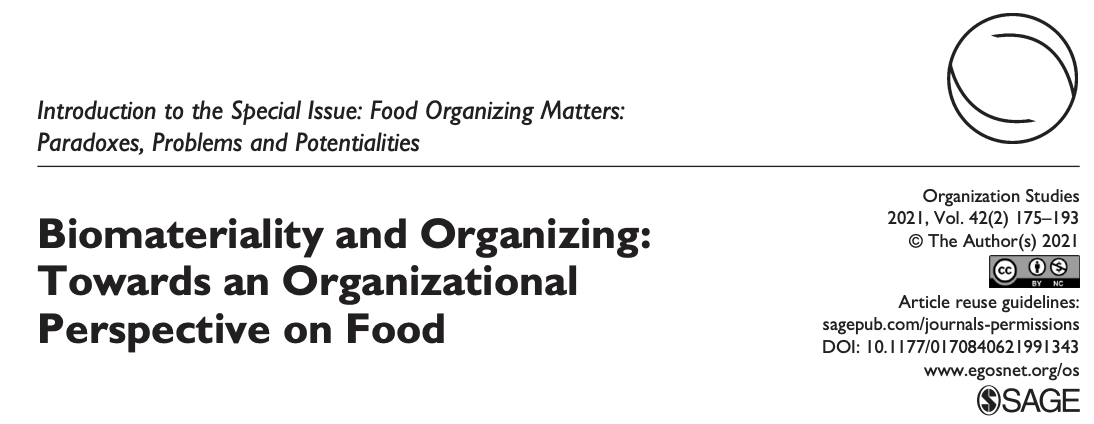
Professor Silviya Svejenova features as guest editor and has contributed to the introduction together with Professors Christine Moser, Juliane Reinecke, Frank den Hond and Grégoire Croidieu.
Abstract: In this introduction to the special issue, we first provide an illustrative overview of how food has been approached in organization studies. We focus on the organizing of food, that is the organizational efforts that leverage, shape and transform food. Against this backdrop, we distinguish the agency of organizations and the agency of food and explore their intersection. We argue that the ‘biomateriality’ of food, i.e. its biomaterial qualities, plays a distinctive role in shaping and affecting organizing and organizations. To do so, we present a conceptual framework for analysing food organizing, which highlights the biomateriality of food and its agentic effects on organizational efforts. Thus, we provide researchers with an analytical toolkit to disentangle the different agents (people, organizations, food itself) and the associated processes and mechanisms that play a role in food organizing. We use this analytical toolkit to introduce the different articles in the special issue and put forward some lines of future research.
Link to the intro: https://journals.sagepub.com/doi/pdf/10.1177/0170840621991343

PhD fellow Sophie Marie Cappelen and Professor Jesper Strandgaard Pedersen have contributed with their article entitled "Inventing Culinary Heritage trough Strategic Historical Ambiguity"
Link to the article: https://journals.sagepub.com/doi/abs/10.1177/0170840620918382

Professor Tor Hernes, Postdoc Jonathan Feddersen and Professor Majken Schultz have contributed with their article entitled "Material Temporality: How materiality 'does' time in food organizing"
Link to the article: https://journals.sagepub.com/doi/abs/10.1177/0170840620909974
New project:
Majken Schultz and Tor Hernes have received funding from the Novo Nordisk Foundation
January 2021
Professor Majken Schultz and Professor Tor Hernes have received funding from the Novo Nordisk Foundation for a 4-year long project entitled "Making Distant Futures Actionable: Innovating for a Zero-Carbon Future ". The project, consisting of 4 postdocs, together with Majken and Tor, will analyse the challenges of connecting on-going innovations to distant future goals.They will amongst other work with Novo Nordisk on future launch of novel solutions for diabetes as well as with Arla on the future of packaging.
Abstract: Industry has a critical role to play in accelerating the Green Transition, crucial to the creation of a knowledge-based sustainable society. Accelerating the Green Transition, depends on the ability of actors to create sustained mutual interplay between innovative solutions and distant climate goals. With barely more than a decade left to prevent long-term damage to the planet, there is an urgent need to understand how we can make distant futures actionable. “Making Distant Futures Actionable” is a project that investigates how on-going innovative solutions are integrated into long-term climate goals.
CLICK HERE FOR MORE INFORMATION
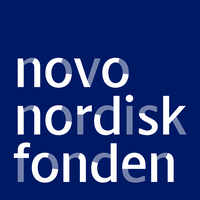
Forthcoming publication:
Iben Stjerne and Silviya Svejenova publish together with Matthias Wenzel a paper in the RSO
December 2020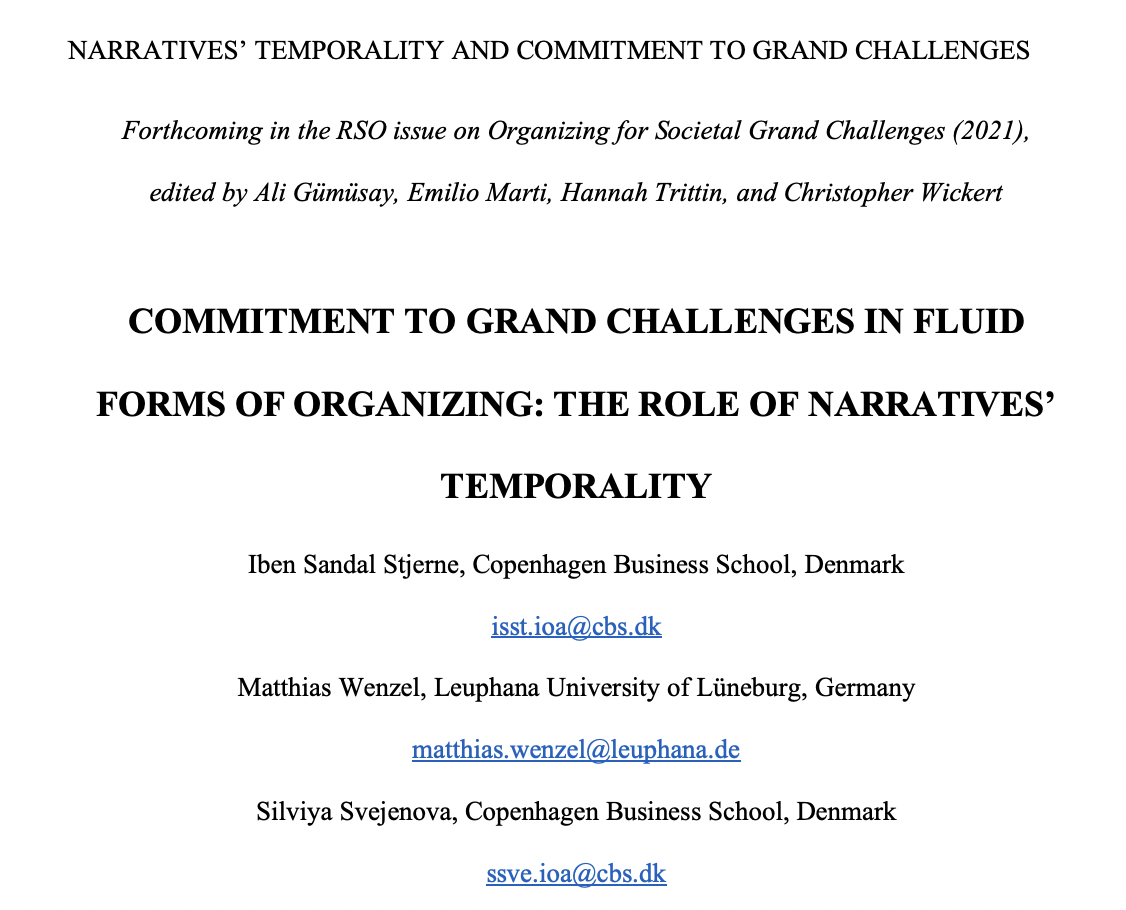
Title: Commitment to Grand Challenges in Fluid Forms of Organizing: The Role of Narratives' Temporality
Abstract: Organization and management scholars are increasingly interested in understanding how “fluid” forms of organizing contribute to the tackling of grand challenges. These forms are fluid in that they bring together a dynamic range of actors with diverse purposes, expertise, and interests in a temporary and nonbinding way. Fluid forms of organizing enable flexible participation. Yet, they struggle to gain and sustain commitment. In this case study of the SDG2 Advocacy Hub, which supports the achievement of zero hunger by 2030, we explore how the temporality of narratives contributes to actors’ commitment to tackling grand challenges in fluid forms of organizing. In our analysis, we identify three types of narratives—universal, situated, and bridging—, and discern their different temporal horizons and temporal directions. In doing so, our study sheds light on the contributions by the temporality of narratives to fostering commitment to tackling grand challenges in fluid forms of organizing. It suggests the importance of considering “multitemporality,” i.e., the plurality of connected temporalities, rather than foregrounding either the present or the future.
Ph.D. defense:
Jonathan Feddersen successfully defended his ph.d. thesis online
December 2020
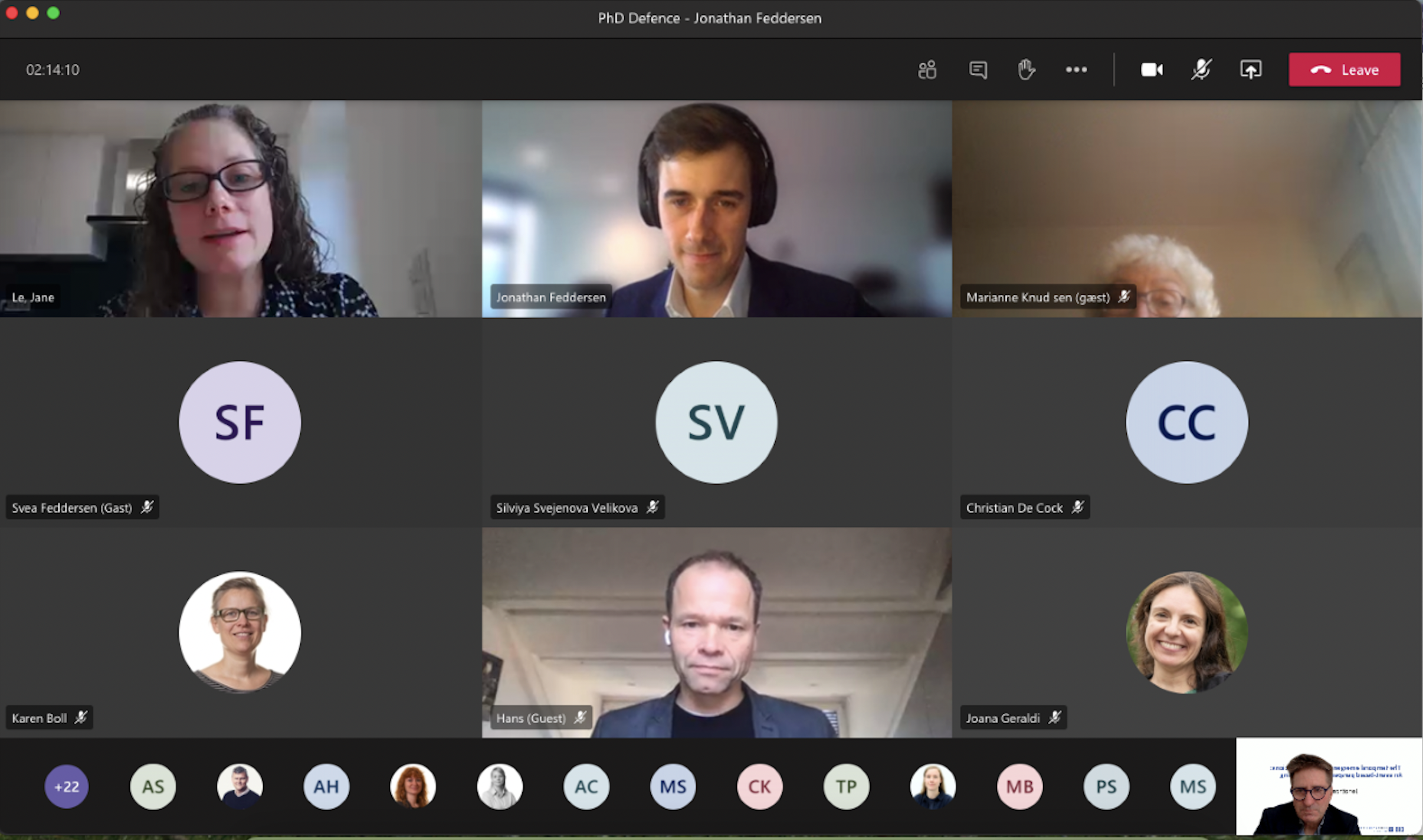
Jonathan Feddersen successfully defended his ph.d. thesis entitled " The Temporal Emergence of Social Relations: An Event-based Perspective of Organising ".
"The thesis examines the emergence of social relations in the flow of time. I report findings from an ethnographic study of BLOX, a landmark building and innovation hub in Copenhagen focused on sustainable urban development, complemented by interviews and archival data. The dissertation develops an event-based theoretical perspective and methodological approach to study the mutual interplay between social actors’ enactment of situated events ‘in time’, and the emergent pattern of events ‘over time’. From an event-based perspective, I conceptualise social actors and their relations as trajectories of remembered past, ongoing present, and projected future events. Through studies of collaborative innovation and material temporality, I show how the event-based approach advances an understanding of the temporal emergence of social relations."
Primary supervisor: Professor Tor Hernes, IOA
Secondary supervisor: Professor Silviya Svejenova Velikova, IOA
Assessment Committee:
- Professor Christian de Cock (Chair), IOA
- Professor Jane Lê, WHU - Otto Beisheim School of Management
- Professor Hans Berends, Vrije Universiteit Amsterdam - School of Business and Economics
Thesis: The thesis is available at CBS Research Portal
Marcus Lantz as visiting research assistant at COT
November 2020
When is it time for emotions?
When humans try to persuade each other to make decisions and take action, time and emotion both play large roles. With a background in rhetorical studies, Marcus Lantz is currently a visiting research assistant at COT trying to better understand the role of time and temporality in organizational contexts of uncertainty and legitimate disagreement such as strategy-making, product innovation, change management and crisis handling , which the current Covid-19 pandemic has emphasized.
Marcus successfully defended his PhD dissertation titled “Timely Emotion: The Rhetorical Framing of Strategic Decision Making” (publicly available at the CBS Research Portal) in October and has been part of COT for the past months. The dissertation combines a pragmatist philosophy of science with an action-research empirical approach, and Marcus conducted two qualitatively informed field studies, totaling 22 months, as well as a final, mainly theoretical study of a key political speech.
The dissertation demonstrates how the ongoing negotiated organizing of emotion constitutes compelling reasons to act. In relation to time and temporality and the existing work taking place at COT, two aspects in the dissertation are particularly relevant; acting and arguing with prudence, and the temporality of emotion.
- Prudence: One study finds that the constitution of a compelling opportune moment, deciding when to act, requires both a fit with existing organizational interpretations and an active shaping of what the organization aspires to achieve.
- Temporality of emotion: Another study finds that experiences and choices from the past influence the emotions that decision makers feel in the present and inform the intertemporal mechanisms that allow them to take the leap of faith of decision making.
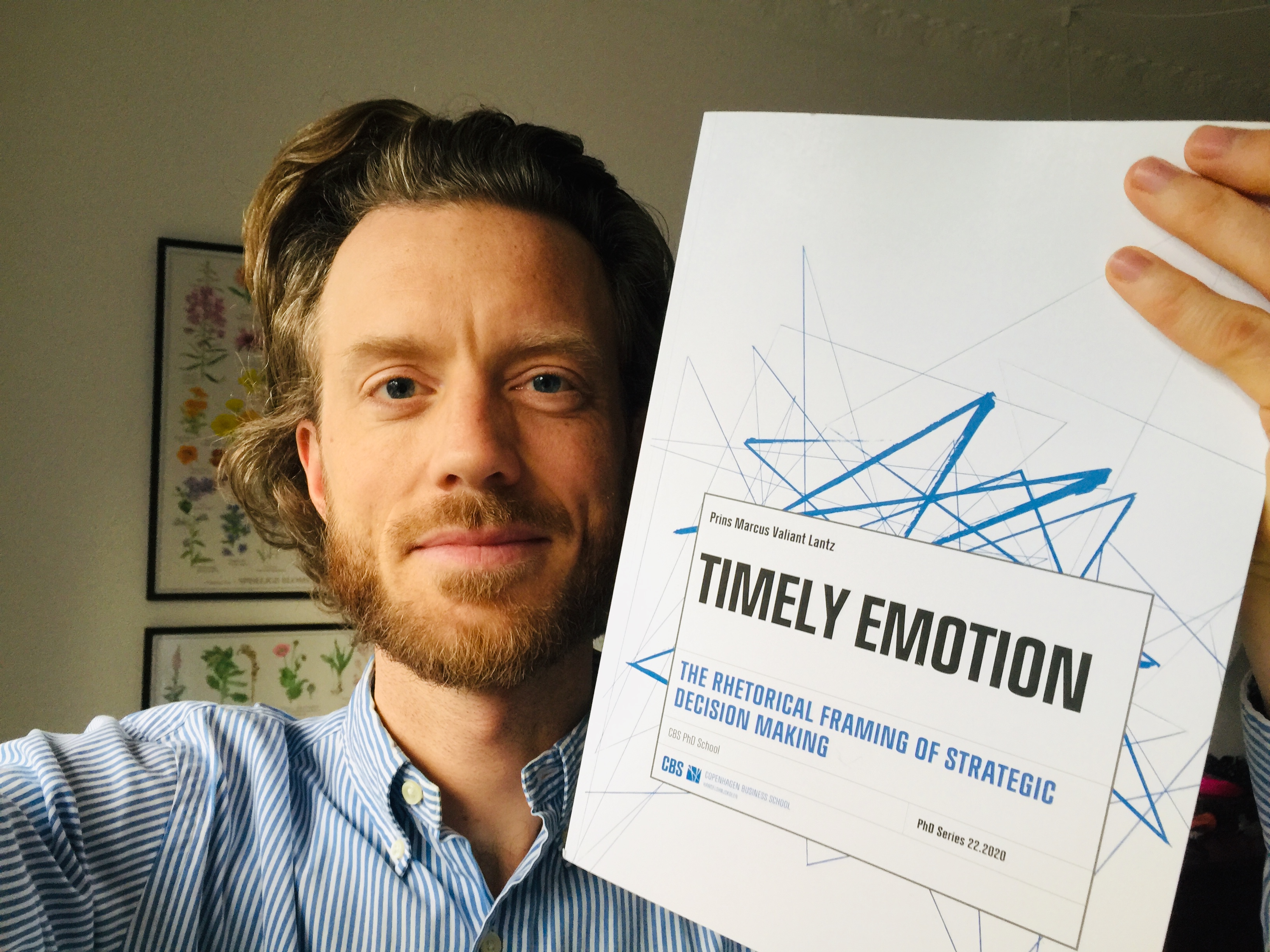
Event: Postdoc Miriam Feuls will speak at a webinar on July 29th
July 2020
Postdoc Miriam Feuls will speak at a webinar from the King’s Business School Meaning and Purpose Network (bringing academics and practitioners together) on Why Purpose Matters in the Return from Lockdown.
You can register for the event here: https://www.kcl.ac.uk/events/meaning-purpose-network-why-purpose-matters-in-the-return-from-lockdown
Title: Making long-term-goals actionable
Abstract: The awareness of the need to act now in order to prevent a future climate disaster is growing and more and more organizations publicly announce ambitions for the very long-term, such as becoming carbon neutral in 2050. In her talk, Miriam Feuls presents preliminary results of a qualitative longitudinal study of sustainability and innovation processes in a Danish dairy corporation that illustrates the central role played by time horizons in developing an actionable sustainability and innovation agenda. She discusses how the time horizon of 2050 was integrated in the organization, which challenges occur, when having to address both the short-term and the long-term, and how they are dissolved. She presents three interconnected processes that the organization engages in to make the long-term actionable.
Paper Publication:
Tor Hernes has co-authored a paper that appears in the Project Management Journal
June 2020
https://journals.sagepub.com/doi/abs/10.1177/8756972820931276
Title: The Challenges of Implementing Temporal Shifts in Temporary Organizations: Implications of a Situated Temporal View
Abstract: We apply a situated temporal view to reveal the acute challenge actors face in making changes when their project moves toward its final deadline. A situated temporal view takes account not just of the dwindling time left to change the future but also the lingering past, the combination of which poses particular challenges to organizers. We discuss aspects of temporary organizing that make such temporal shifts challenging: the complex interplay between temporal structures and practices, multiple temporal orientations, and deferred timing of temporal shifts. We suggest ideas for further research to apply a situated temporal view to temporary organizing.
Paper Publication:
Postdoc Vibeke Kristine Scheller has published a paper on Understanding, Seeing and Representing Time in Tempography
May 2020
http://www.qualitative-research.net/index.php/fqs/article/view/3481
Title: Understanding, Seeing and Representing Time in Tempography
Abstract: I discuss in this article how ethnographers understand, see and represent time by presenting a research study of a newly established cardiac day unit. Previous discussions of time in relation to ethnography mainly revolved around choosing an appropriate tense for writing up the text, and few studies attempted to develop a framework for conducting time-oriented ethnography in organizations, i.e., tempography. I argue that doing tempography requires considerations in several phases of the research process: how we understand time through theory; how we see time in different qualitative methods; and how we represent time in writing. I present empirical findings that illustrate different ways that time emerges in the ethnographic research process, for example, in observational accounts, through depictions and narratives that support different temporal conceptualizations, patients' stories about their trajectories and as ethnographic accounts of professional work. I contend that ethnographers need to consider: 1. methodological temporal awareness as recognition of coexisting temporal modes in qualitative data; 2. temporal analytical practices as understanding time and temporality through different theoretical concepts; and 3. multi-temporal merging as a matter of representing diverse perspectives in ethnographic writing.
Book publication: Postdoc Miriam Feuls has published her doctoral thesis on Practice-based business model transformation
May 2020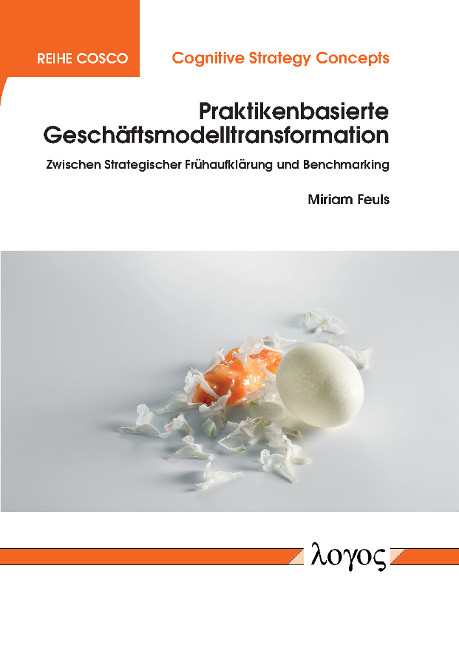
https://www.logos-verlag.de/cgi-bin/engbuchmid?isbn=5037&lng=deu&id
Title: Praktikenbasierte Geschäftsmodelltransformation. Zwischen Strategischer Frühaufklärung und Benchmarking
Abstract: The transformation of the business model is regarded as central challenge for a future-oriented management. It is often assumed that only a high degree of foresight is needed to anticipate profitable developments at an early stage, for example in the form of extensive customer data, trend research or technological future scenarios.
In this book, I contrast this thinking by drawing on the perspective of socio-cultural practices and I develop a method to inspire and enable an organization to transform its business model. The crucial question of business model transformation -- "What will we do differently on Monday? -- is strictly speaking nothing other than the question of how to change organizational practices and the attitudes associated with it.
The method, which is explained on the basis of a practical case, comprises three steps: First, an inventory of the practices characteristic of the current business model is made. Secondly, on the basis of practice theory, innovation-intensive socio-cultural domains with a pioneering character are identified and their deviant practices are carved out. And thirdly, a strategic benchmarking process is carried out, which systematically checks the transferability of these deviant practices into the existing business model. The concept thus follows the logic of the perspicacious future thinker William Gibson, who once said "The future is already there, it´s just not evenly distributed -- yet".
Majken Schultz and Tor Hernes had a debate column about Leadership in the time of Corona in the Danish newspaper "Børsen"
- A time perspective on leadership in these Corona times: What happens to leadership when time horizons collapse?
Link to the article in Danish: https://borsen.dk/nyheder/opinion/ledelsesudfordringer-i-coronakrisen
Majken Schultz and Tor Hernes publish together with Jonathan Feddersen a paper in Organization Studies
March 2020
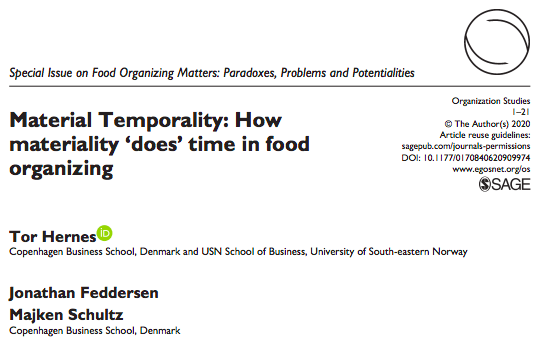
TITLE: Hernes, T., Feddersen, J. and Schultz, M. (2020). Material Temporality: How materiality ‘does’ time in food organizing. Organization Studies.
ABSTRACT
The organic and hence perishable nature of food makes it particularly useful for understanding how the temporal dimension of materiality influences organizing and innovation. We present, as our main theoretical contribution, the concept of ‘material temporality’ to account for the transformation of materials in time and their imagined states at different moments across time, which we label processual and epochal temporality, respectively. Our empirical study shows how two organizations in the beer and dairy industries searched for novel solutions in their past and future. We show how the organizations’ potential for more consequential innovation was greater when they engaged distant past or future epochal temporalities. However, distant epochal temporality may also become uncertain and contested through the lens of ongoing processual temporality. We discuss the implications of material temporality for industries other than food and for organizing in relation to the natural environment.
Tor Hernes and Majken Schultz publish a paper in the inaugural issue of Organization Theory
February 2020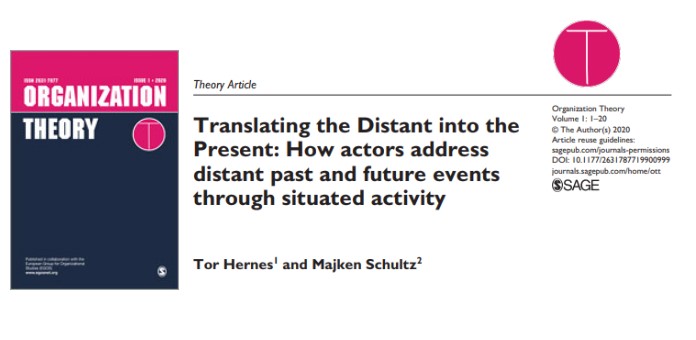
Tor Hernes and Majken Schultz published a paper in the inaugural issue of Organization Theory. In this paper they develop a model for how actors may address distant events through activity, which they argue is a neglected dimension in research areas such as routines, practices and materiality. They also argue that it is crucially important to better understand the dynamics by which distant events are addressed through situated activity because that is what enables actors to question and ultimately transform their on-going temporal structures.
Title: Hernes, T. and Schultz, M. (2020). Translating the distant into the present: How actors address distant past and future events through situated activity. Organization Theory.
Abstract: Situated views demonstrate how on-going activity is both framed by temporal structures and serves to reproduce those same structures. Yet, recent research on temporality shows that addressing distant events enables actors to reflect on and eventually transform the temporal structures that frame their ongoing activity. We develop a theoretical framework of how actors address distant events through of situated activity in organisations through three steps. First, we discuss the notion of situated temporality to describe how actors go beyond, and potentially transform, the temporal structures within which they operate as they address distant events through situated activity. Second, we introduce the concepts of singular and exemplary events to show how distant pasts and futures comprise different combinations of events. Third, we discuss how certain areas of organisation studies that advocate a situated view, notably practices, routines, and materiality, may benefit from a situated temporal view. At the paper’s conclusion we suggest the concept of ‘temporal translation’ to describe the process of how actors may combine different temporalities through situated activity.
